The best paid-for iPhone and iPad apps money can buy
The very best premium music, video, art, design, entertainment, work and study apps for your iOS devices

In the battle for mobile supremacy, Apple’s trump card is the App Store. If you want to do anything properly interesting with a smartphone or tablet, iOS and iPadOS is where it’s at. And here at Stuff, we’re only interested in the best.
This list isn’t about amassing the biggest number of apps nor doubling down on current fads. Instead, we’ve ruthlessly refined our selection until only the finest products remain, so you can load ’em on to one of the best phones on sale right now.
Whether you’re keen on photography, music, digital art, bashing out a novel, or exploring the night sky, these are the best premium iPhone and iPad apps to buy.
The best new iPhone and iPad app
Get an instant fix with the best premium iOS and iPadOS app tickling our fancy right now.
Fugue Machine Rubato
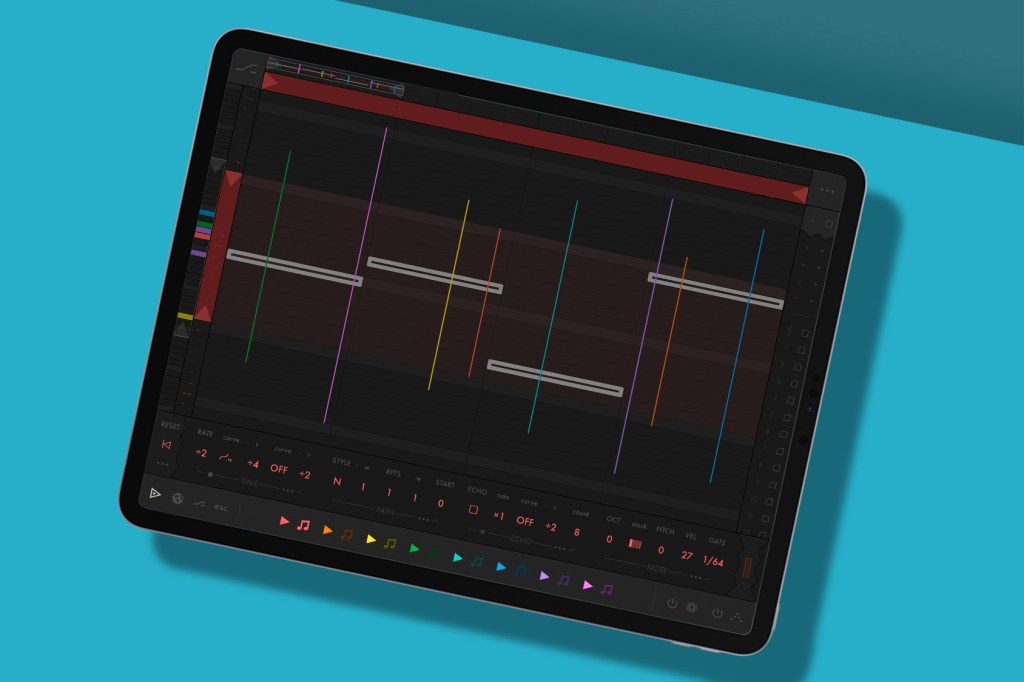
On hearing about an app being inspired by composition techniques used in Baroque music and serialism – or even, more snappily, ‘Bach in a box’, anyone lacking a classical music bone might feel ready for a little snooze. But Fugue Machine Rubato should not be dismissed, because it’s a hypnotic and brilliant music-creation app.
You get up to eight playheads that can ping back and forth over notes tapped out on a piano roll. Pitch, speed, direction and a host of other parameters can be adjusted for each, and notes can be automated. The interactions between the playheads allow melodies to form.
Newcomers will be amazed how quickly they can create beautiful music; pros will love how they can route each playhead to other apps and devices. In short, it’s an iPhone and iPad music-creation app everyone should buy. Although if you find the app’s complexity or its price tag a bit too daunting, the simpler, cheaper and similarly superb Fugue Machine Classic ($19.99/£19.99) remains available.
The best of the rest…
The best iPhone and iPad apps, handily organised into categories. Because we’re nice like that.
The best iPhone and iPad photography apps
Photon Library
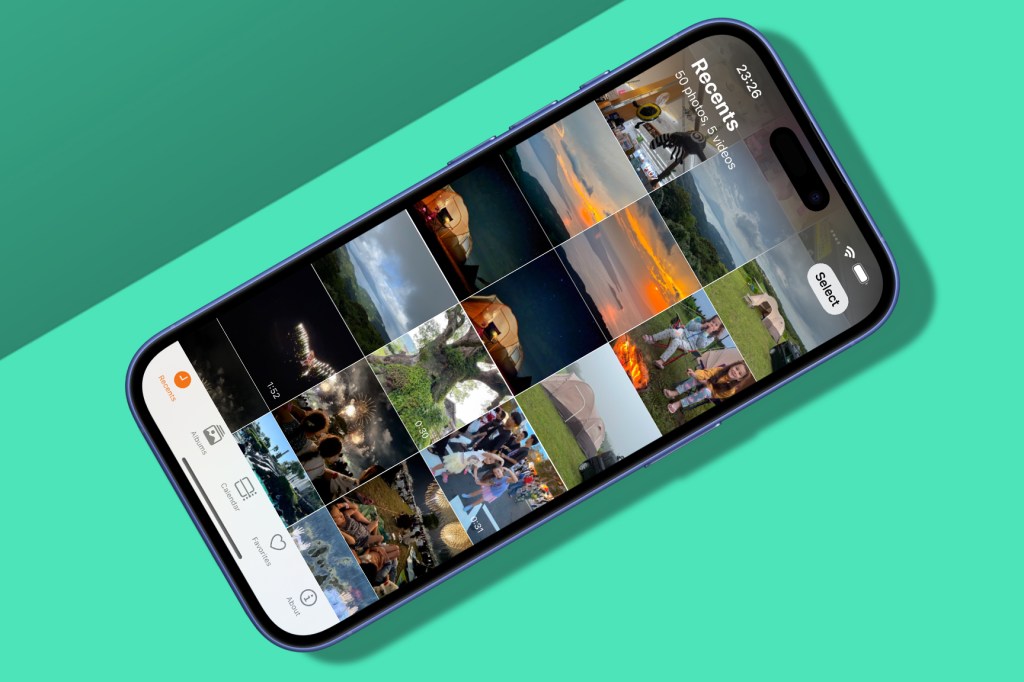
In iOS 18, Apple unleashed a Photos redesign. People either love it or hate it. If you fall into the latter camp, Photon Library lets you turn the clock back. Sort of.
Fire up the app, give it access to your photos, and you get an old-school tab bar that lets you quickly switch between recent photos, albums, and a browsable calendar. In any view, repeatedly tapping the tab button toggles you between the oldest and newest photo.
Unlike Cs Music Pro, which comes across like a full-featured old-school Music app, Photon Library doesn’t seek to replicate everything from Photos. There’s no editing, for a start. But as an alternate way to browse your snaps, it’s a great development in the world of photo apps.
Buy Photon Library ($6.99/£6.99)
Presets
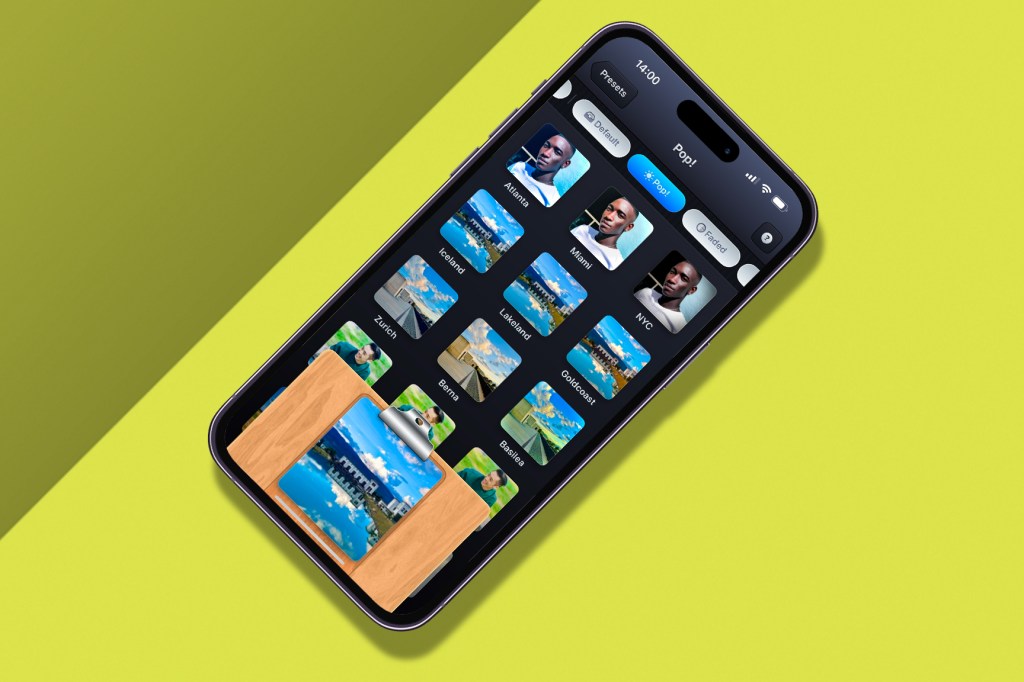
Snapseed lets you save a stack of edits as a custom filter (or ‘look’, as Google puts it). Handy. Apple Photos does not. Fortunately, Presets heroically fills the void.
Make edits in Photos, go to … > Copy Edits, and switch to Presets. The app spots what you copied and lets you stash the edit. Prior saved edits – and dozens of bundled free presets – can be arranged in collections. With a tap, you can add one to the clipboard, ready to send back to Photos and apply to a snap via Paste Edits. Easy.
If you regularly edit pics in Photos, Presets is a must-have and a bargain. We also love its visual design, which warmed our nostalgia nubbin with its textured interface elements and realistic clipboard.
Buy Presets (free + $2.99/£2.99 lifetime IAP)
Photomator
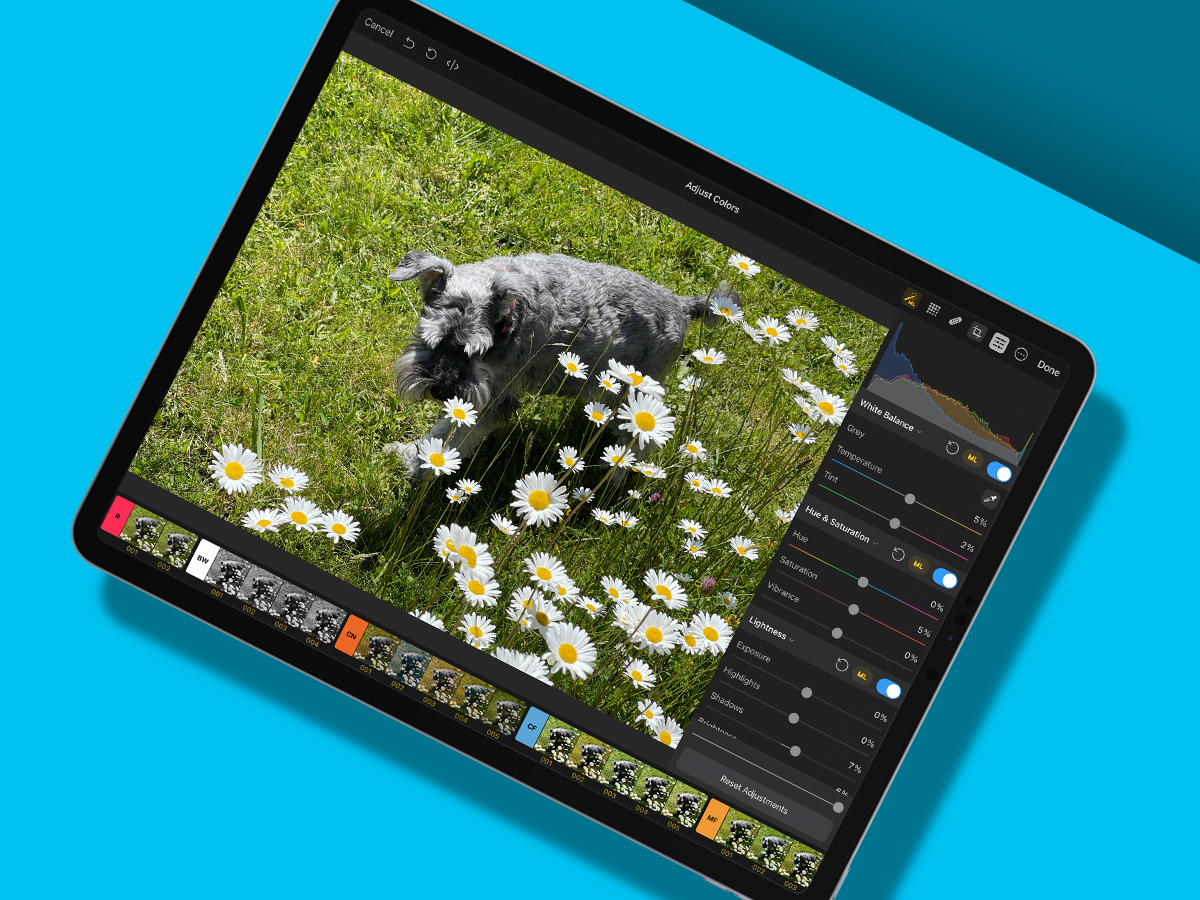
Apple bangs on about machine learning a lot, but it’s with apps like Photomator where this technology proves its worth. Load a snap, prod the ML Enhance button and adjustments are instantly made, based on the app having been ‘trained’ on 20 million professional photos.
Photomator doesn’t get things right every time, sometimes ‘normalising’ late evening light and sunrises/sunsets. Fortunately, you can tweak the app’s efforts by way of a slew of sliders that sit behind an adjustments button.
As a one-click photo editor for newcomers or a time-saver for pros, Photomator is superb – on iPad and iPhone alike. Although now Apple has bought the app, maybe be cautious about splurging on that lifetime payment.
Buy Photomator ($29.99/£29.99 per year or $149.99/£149.99 lifetime)
Halide
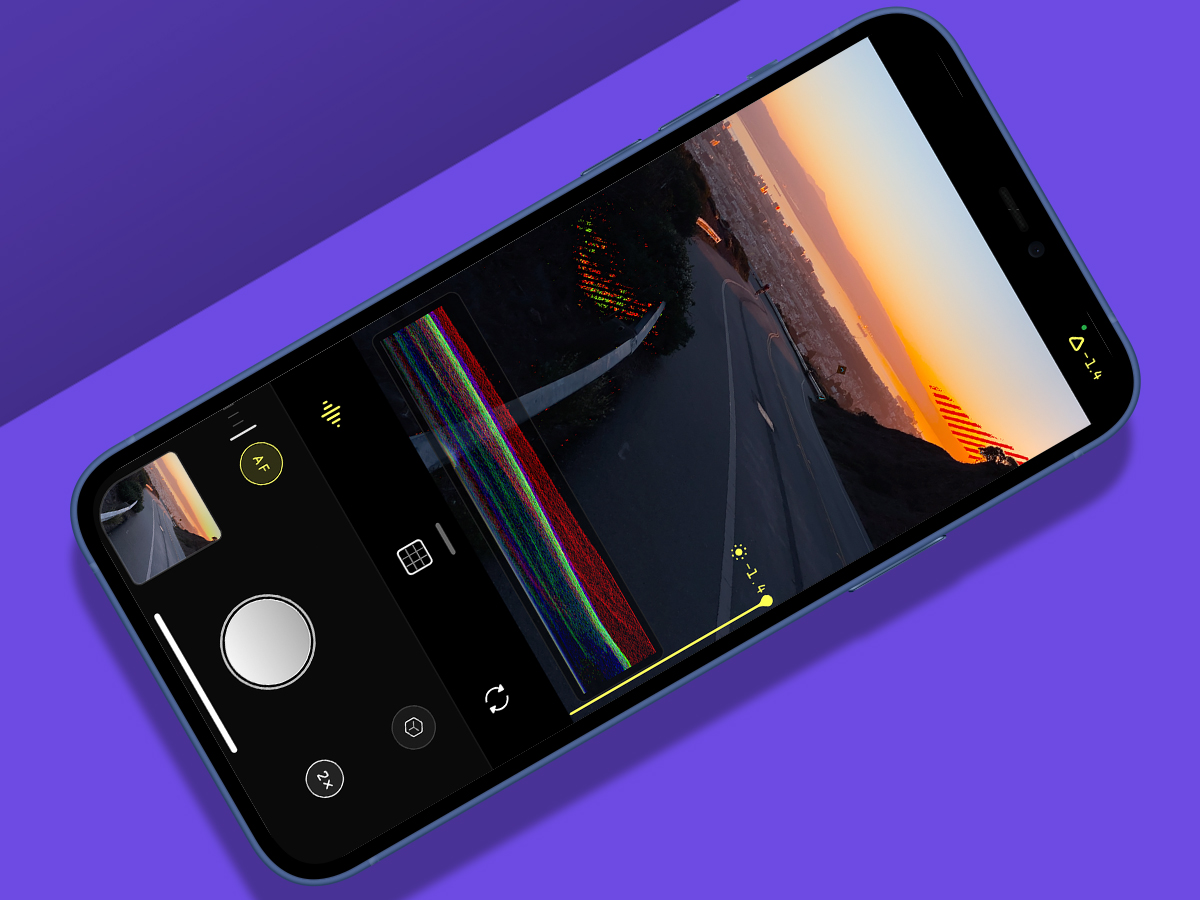
Halide – or Halide Mark II – Pro Camera, to use its full name – gives you a full suite of tools to squeeze more power out of your iPhone’s snapper. There are guides and manual controls for focus and exposure – although the app’s hardly alone in that.
Where Halide excels and earns its price tag is with features you find when you dig deeper: a focus loupe to ensure captured subjects are sharp; zebra exposure stripes; Instant RAW processing; simultaneous multi-format capture; and far more.
Remarkably, this all comes to iPad too, with a fully optimised tablet-first interface, rather than blown-up iPhone controls. You might baulk at the outlay, but you won’t find a better camera for Apple devices, and what you get represents great value.
Buy Halide Mark II – Pro Camera ($19.99/£19.99 per year or $59.99/£59.99 lifetime)
Affinity Photo 2

Along with taking on Adobe on the desktop, Serif launched itself at the iPad with Affinity Photo. The app’s a full-fledged image editor for iPad, marrying the features of the desktop version with the touchscreen and Pencil smarts of Apple’s tablet.
On any modern iPad, you get a fast, immersive, tactile experience, whether fiddling with adjustment layers or smushing live effects with your fingers. And this is no cut-down take on desktop fare – this is desktop-quality software but with an eye on the future rather than the past.
Hipstamatic Classic
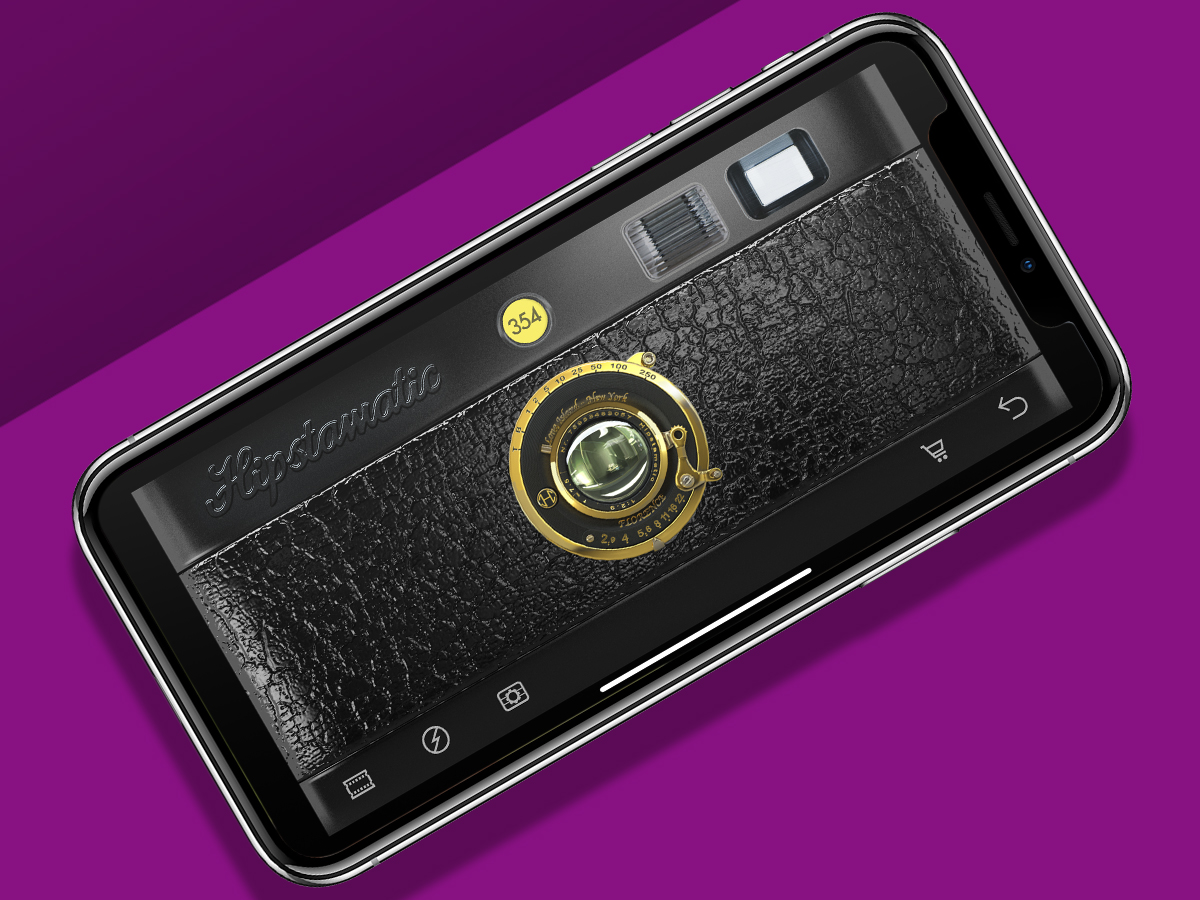
There are two sides to retro-snapper Hipstamatic Classic. Hold your phone in landscape, and it goes properly old-school. You get an analogue camera with tiny viewfinder, the main nod to modernity being able to swipe to access new lenses and flashes. It’s skeuomorphism like Apple used to love!
If you hate textures, there’s a pro mode, too, which is so minimal Jony Ive could eat his dinner off of it. As if that’s not enough, there’s a darkroom editing suite as well, in which you can delve into a slew of adjustment tools and presets. Flashy and fun, then, whichever way you’re holding it.
The best iPhone and iPad art and design apps
Procreate
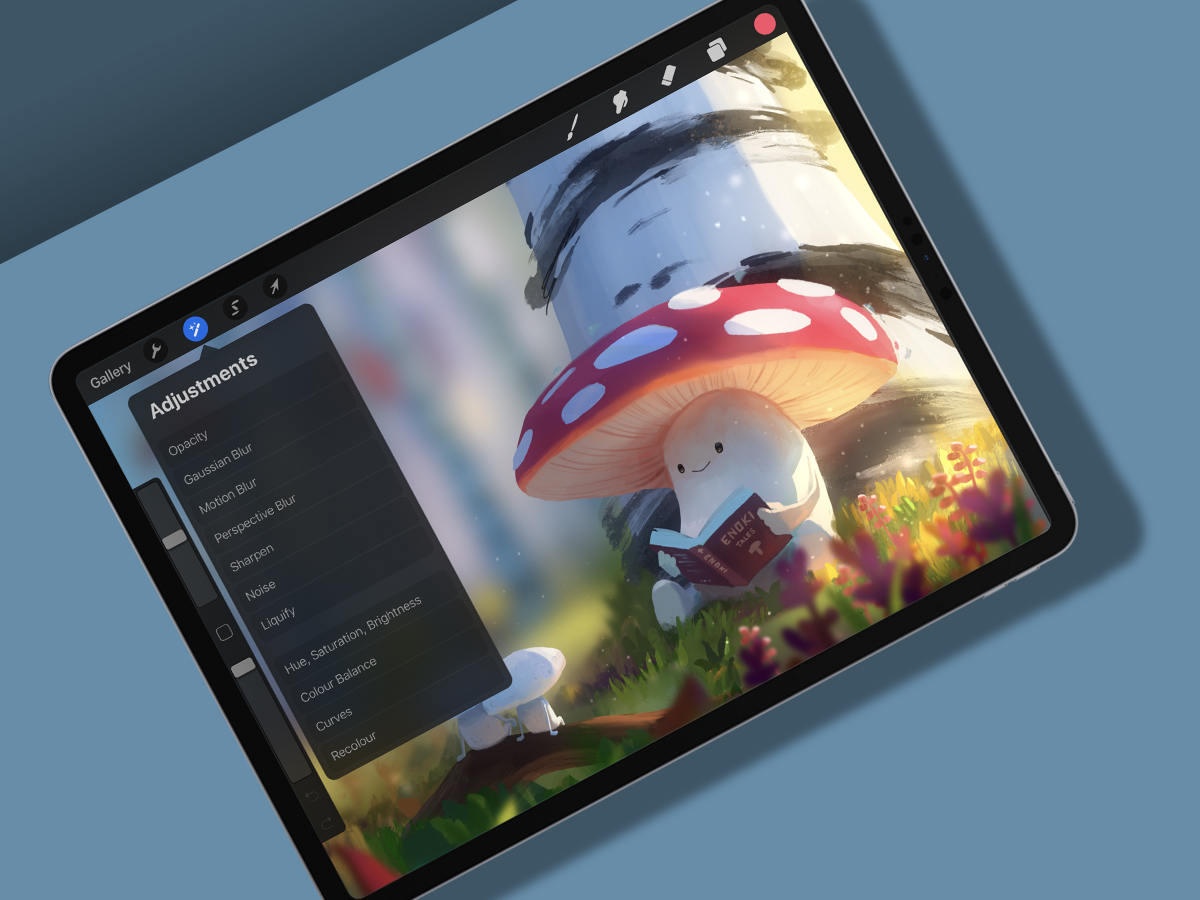
Back in 2009, Jorge Colombo created a New Yorker cover using Brushes for iPhone. That was pretty darn mind-blowing at the time, but there are now countless apps for digital artists, battling for your affections and your wallet. Procreate is our absolute favourite — a desktop-class app that’s suitable for pros and dabblers alike.
The app excels because it has enough features and brushes to be flexible, provides quick and easy access to them all, and then gets out of your way when you’re creating a masterpiece. If you’ve an iPad Pro, a Pencil and an artistic bent, you’re going to be in heaven.
Buy Procreate for iPad ($12.99/£12.99)
Mini-me: Procreate Pocket
For a long while, the iPhone take on Procreate was a limited version of its iPad sibling. But the revamped Procreate Pocket ($5.99/£5.99) includes a full feature set, an interface cleverly optimised for the smaller screen, and customisable brushes that can be exported, shared, and imported.
Affinity Designer for iPad
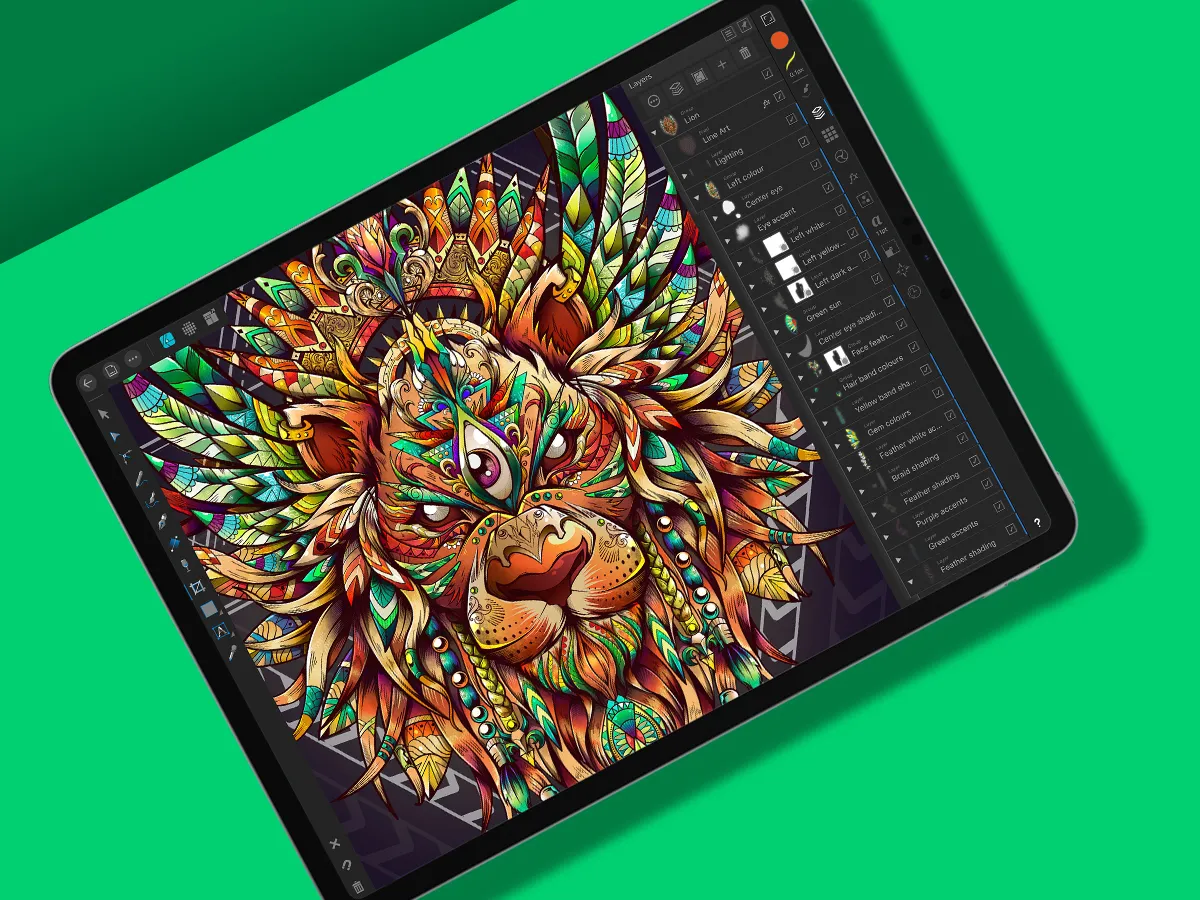
If your creative endeavours rely on vectors, you won’t find a better editor for iPad than Affinity Designer. It’s primarily geared towards precision vector art, logos and illustration, but has the chops for crafting technical drawings and UI design too.
Given how ambitious this all is, the app’s surprisingly fluid to use, making heavy use of gestures, whether you’re flicking a panel icon to adjust a setting, or using multitouch to instantly access contextual controls for the current tool. It’s just the job for freeing mobile illustrators from the chains of a desktop, especially when armed with an iPad Pro and an Apple Pencil.
Buy Affinity Designer for iPad ($17.99/£17.99)
Quick draw: Linia Sketch
If you just want to doodle, Linia Sketch ($14.99/£14.99 year year or $49.99/£49.99 lifetime) focuses on getting ideas down quickly. Power’s there when you need it, though, with grids, layers, and a Zipline feature for easily drawing shapes and lines.
Affinity Publisher for iPad

The third app in the Affinity series, Publisher deftly boots into the sea another thing the iPad ‘can’t do’. In this case, layout design. With this app you could conceivably put together an entire issue of Stuff, all while relaxing with your iPad on the sofa.
Like Serif’s other Affinity apps, Publisher is full-on desktop-grade fare too. The interface and tools are optimised for iPad, but you get master pages, guides and grids, advanced typography and design components, asset placement, and plentiful export options.
Naturally, there’s integration with Serif’s other tools (which you can also buy, across iPad, Mac and Windows, for a one-off $169.99/£169.99 – for the lot). So as an entry point for the design-curious or a layout tool for jobbing designers on the go, this one’s a good bet at 18 quid.
Buy Affinity Publisher for iPad ($17.99/£17.99)
Pixaki 4 Pro
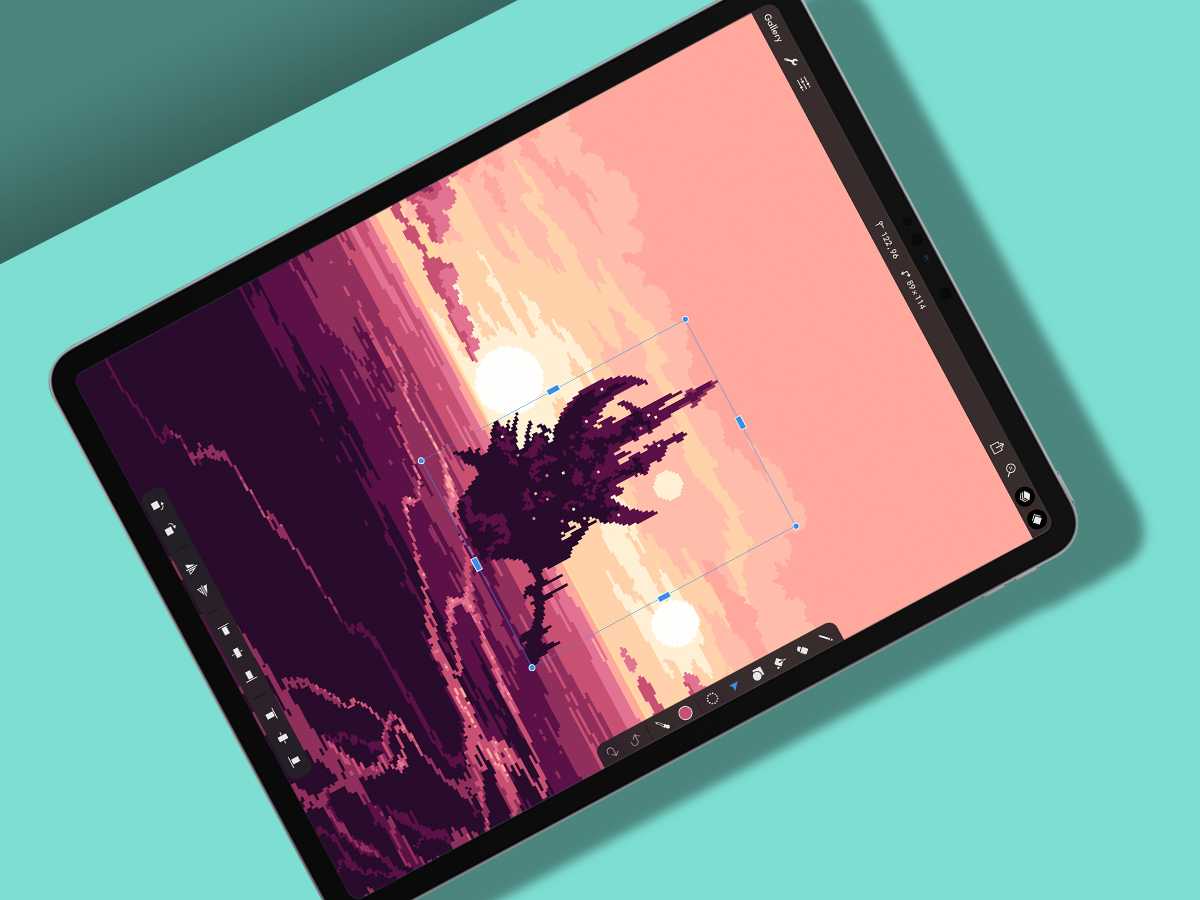
For some, video art isn’t a thing unless the pixels are sharp enough to cut yourself on. But there’s more to pixel art than nostalgia – you also feel the artist laboured over the position of every dot. On iPad, nothing beats Pixaki for fashioning your own retro graphics.
This desktop-quality app is packed full of features and tools – shaped and dither brushes; a lockable line tool; layers and onion skinning for animation; multiple selection modes and transforms. It’s ideal whether you’re working up a delicate isometric landscape masterpiece, or want to try your hand at crafting animation that resembles something that could have once lived on a Commodore Amiga.
If you’re not quite ready to take the plunge, try Pixaki Intro, which is a free version of the app that limits you to 160px images and three layers. Got the previous version of Pixaki? Grab the upgrade bundle to save a few quid.
Emulation station: Retrospecs
Rather than drawing your own old-school pics, transform existing photos and videos into pixel art with Retrospecs (free + $2.99/£2.99 lifetime IAP). Loads of systems and effects are available; and for anyone wanting to get properly geeky, it’s even possible to create bespoke emulations.
Mextures
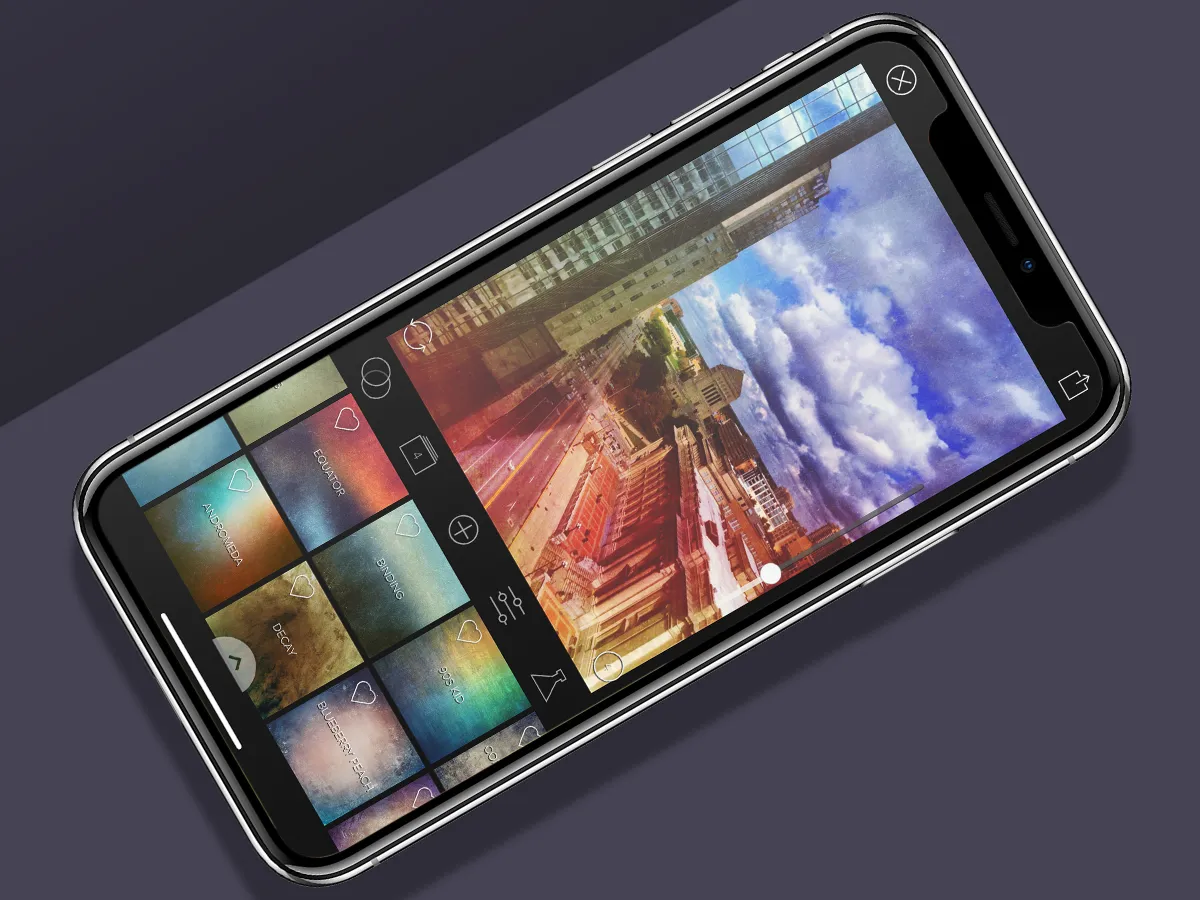
As iPhone cameras become increasingly powerful, you get higher quality and more detailed photos. But there’s a sense the character within photography is being lost – a problem Mextures aims to resolve.
The app includes some editing tools, but is mostly of interest for its selection of textures. Elements include film scans, grunge and gradients, all of which can be added and experimented with in a non-destructive manner using a robust layers system.
If you create something amazing, share your ‘formula’ with the Mextures community. Feeling lazy? Just grab a particularly dazzling formula someone else has uploaded.
The best iPhone and iPad video, animation and podcast creation apps
LumaFusion
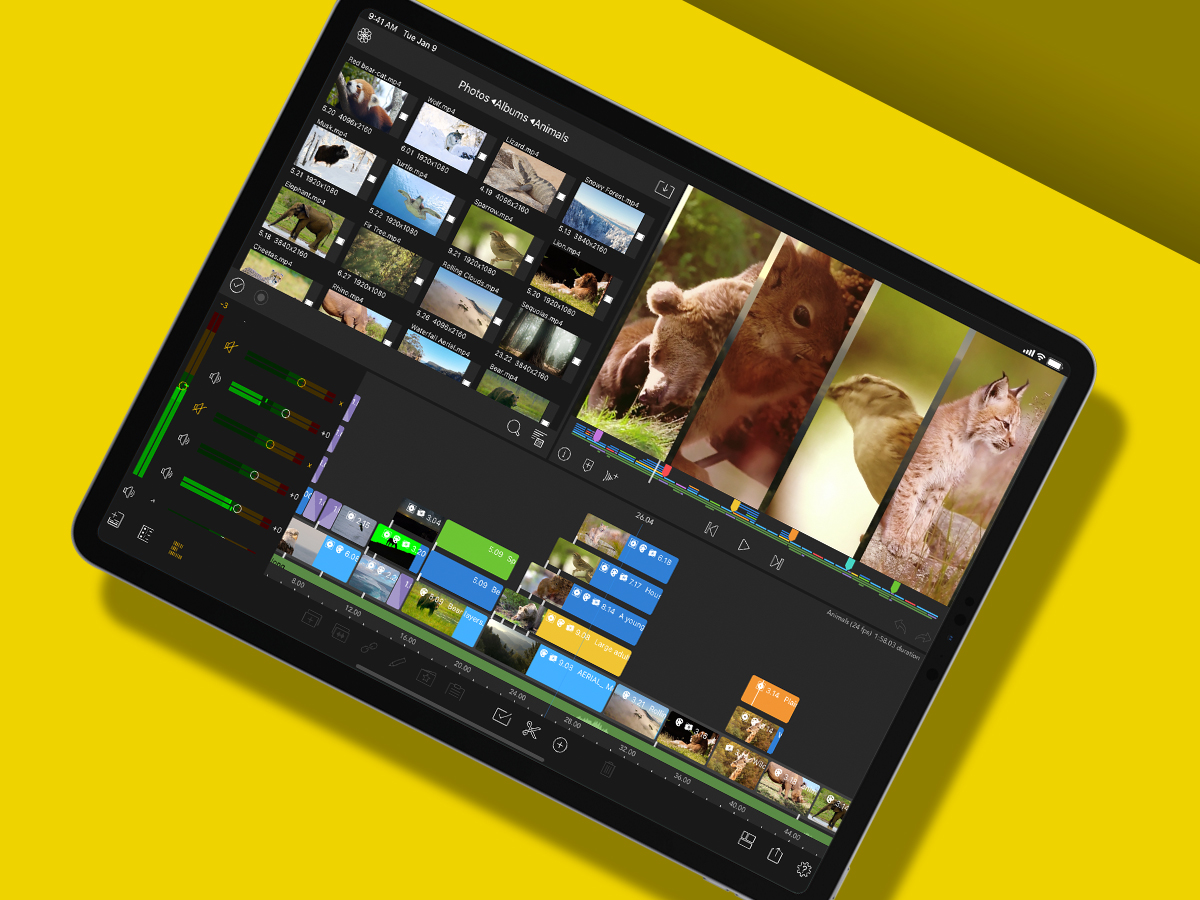
Should Apple’s iMovie not be enough for your Hollywood ambitions, LumaFusion brings desktop-grade editing to your iPad – and even your iPhone. Sure, things are a squeeze on the latter, but whatever device you use you gain access to multiple video and audio tracks, a slew of transitions and effects and a powerful titler.
On an iPad Pro in particular, LumaFusion shines. We’ve seen pro video editors wide-eyed at the combination of software and hardware, scything through 4K footage in a manner that doesn’t make logical sense when staring at a tablet rather than a powerful desktop PC. And if you miss one aspect of a PC set-up – the bigger screen – LumaFusion is one of the rare iPad apps that can fully utilise an external display, using it for your preview.
Buy LumaFusion ($19.99/£19.99)
Kino
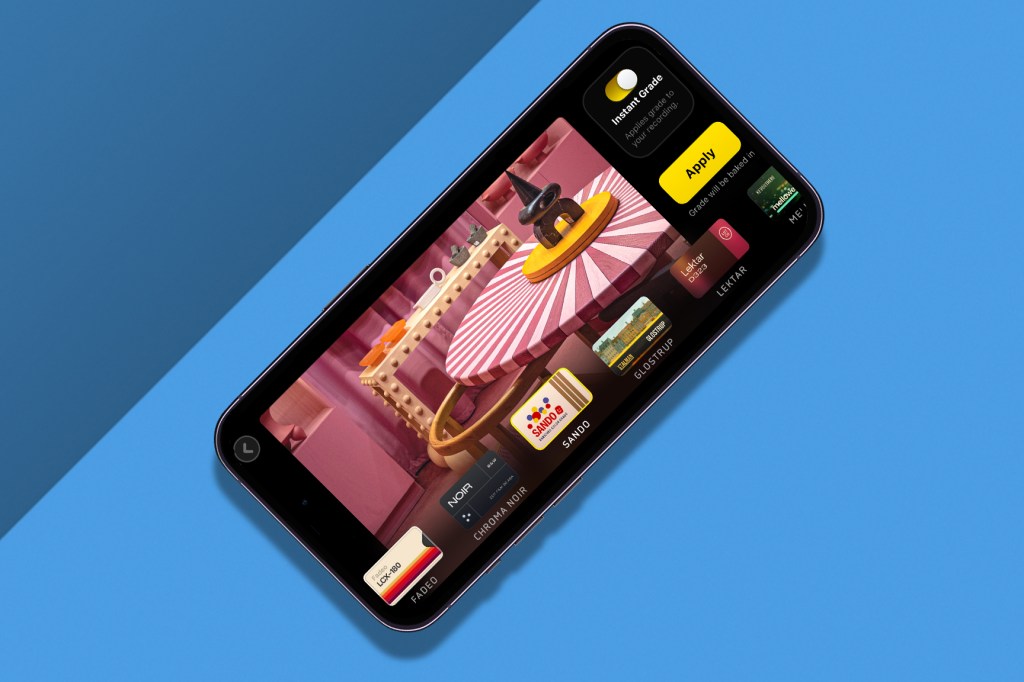
This one finds the team behind acclaimed camera app Halide having a crack at video. The interface is clutter free, with a huge viewfinder mercifully unobstructed by technical gubbins. But plenty of features exist to help you secure your Hollywood masterpiece: readily accessible manual controls; a ‘telltale ring’ to show you’re recording; a lockable shutter; and a live free storage readout.
Kino also wants everything you shoot to look amazing. It uses an ‘AutoMotion’ exposure mode by default, to make movies look more cinematic. And there are colour presets to burn in or apply later, along with the means to import your own LUTs.
If that last bit sounds like gibberish to you, that’s… kind of the point. This app’s as simple or as complex as you need – ideal, then, for seasoned videographers and folks just starting out.
Captionista

Full-fat video platforms automate subtitles these days, but that’s not the case for social media. This is bad for accessibility – and also from a wider viewing standpoint, given that videos often initially play in silence, and viewers might not be able to turn up the volume to fully appreciate your miniature cinematic epics.
Enter: Captionista. This wonderfully conceived app removes the faff from subtitling. You add your script and then tap the screen while playing back your video. This breaks the script into chunks that can subsequently be edited and tweaked. Pay and you can nuke the watermark and dig into loads of subtitle themes and styles; but even for free, this one’s a must.
Buy Captionista (free or $21.99/£19.99 per year)
Procreate Dreams
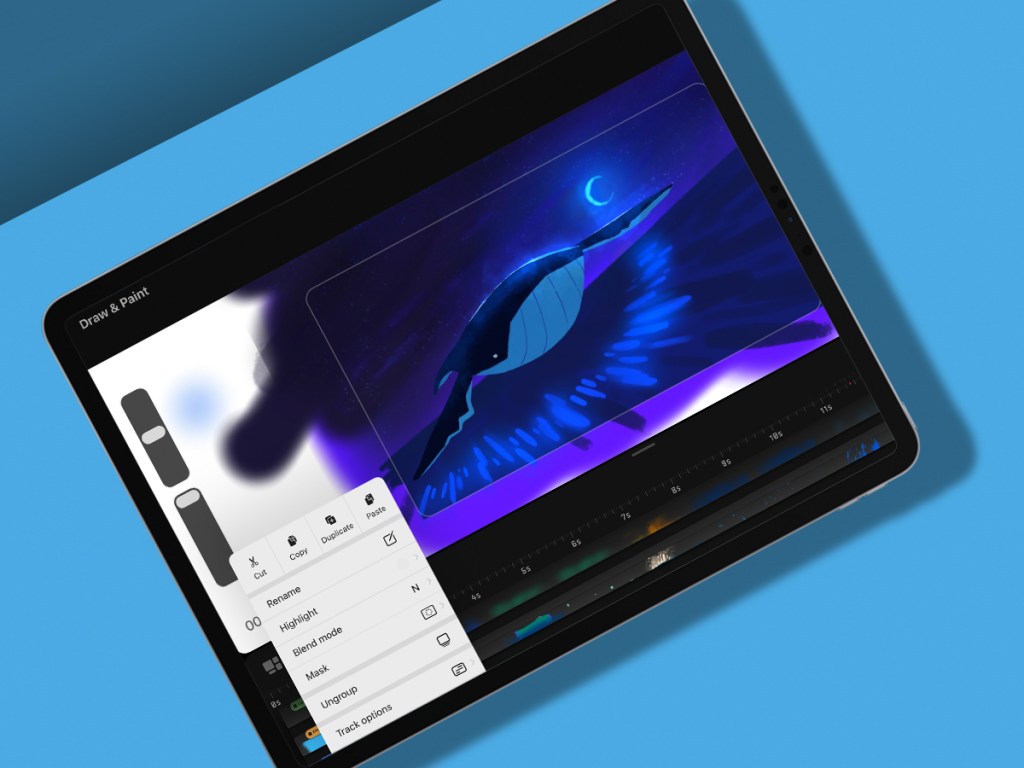
Having reimagined painting for the touchscreen, the team behind the superb Procreate has taken a crack at images that move. In Dreams, you get all the brushes to fashion gorgeous images, but also timelines to bring them to life.
You can go old-school with a flipbook, drawing frame-by-frame. Or you can automate animated components with keyframes and transitions – and even try your hand at live ‘performance’ animation by dragging an object with a finger or an Apple Pencil.
Just as animation is more complex than drawing, so too is Dreams tougher to grasp than Procreate. Also, the interface has an unfortunate tendency to play ‘hide the feature’. But a read through the online handbook should set you right, after which point you’ll love the power beneath your fingertips and appreciate the affordable one-off price.
Buy Procreate Dreams ($19.99/£19.99)
Ferrite Recording Studio
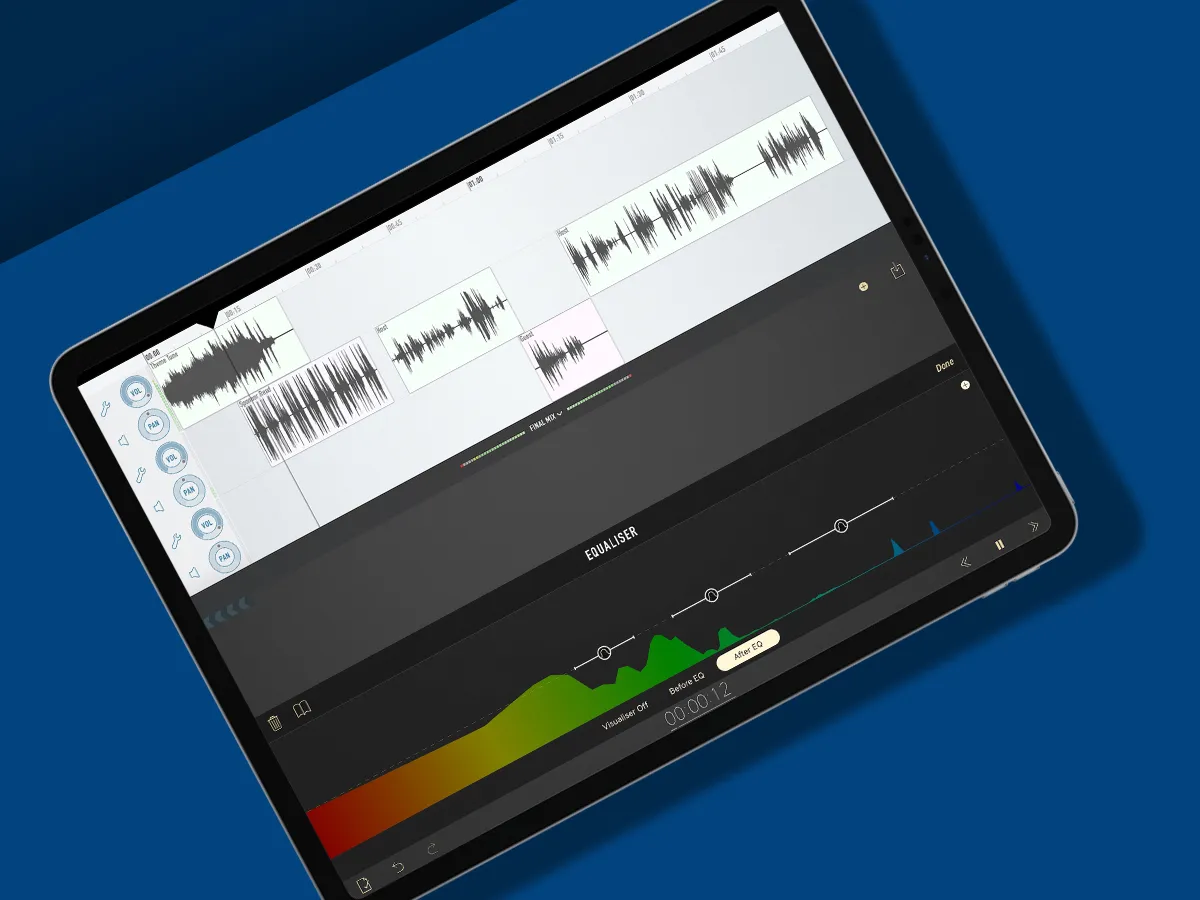
First impressions of Ferrite put you in mind of every other voice recorder you’ve ever used. Stab a record button. Speak into your device or wave it about to capture local ambience. Stop, share, and wonder momentarily about the futility of existence.
But this app has an entire other app lurking beneath the surface. Edit any clip and Ferrite transforms into a mobile podcast studio, enabling you to add and edit multiple tracks, tweaking effects, adjusting panning, and hastily deleting the terrible radio-station intro you thought was hilarious at the time.
With IAP, it shifts from ‘good’ to ‘amazing’. $29.99/£29.99 gets you unlimited recording time, 32 tracks (up from, respectively, one hour and three tracks), and effects for making recordings sound properly professional. (Ferrite 2 ‘pro’ owners can upgrade for half price.)
The best iPhone and iPad music creation apps
Korg Gadget 2
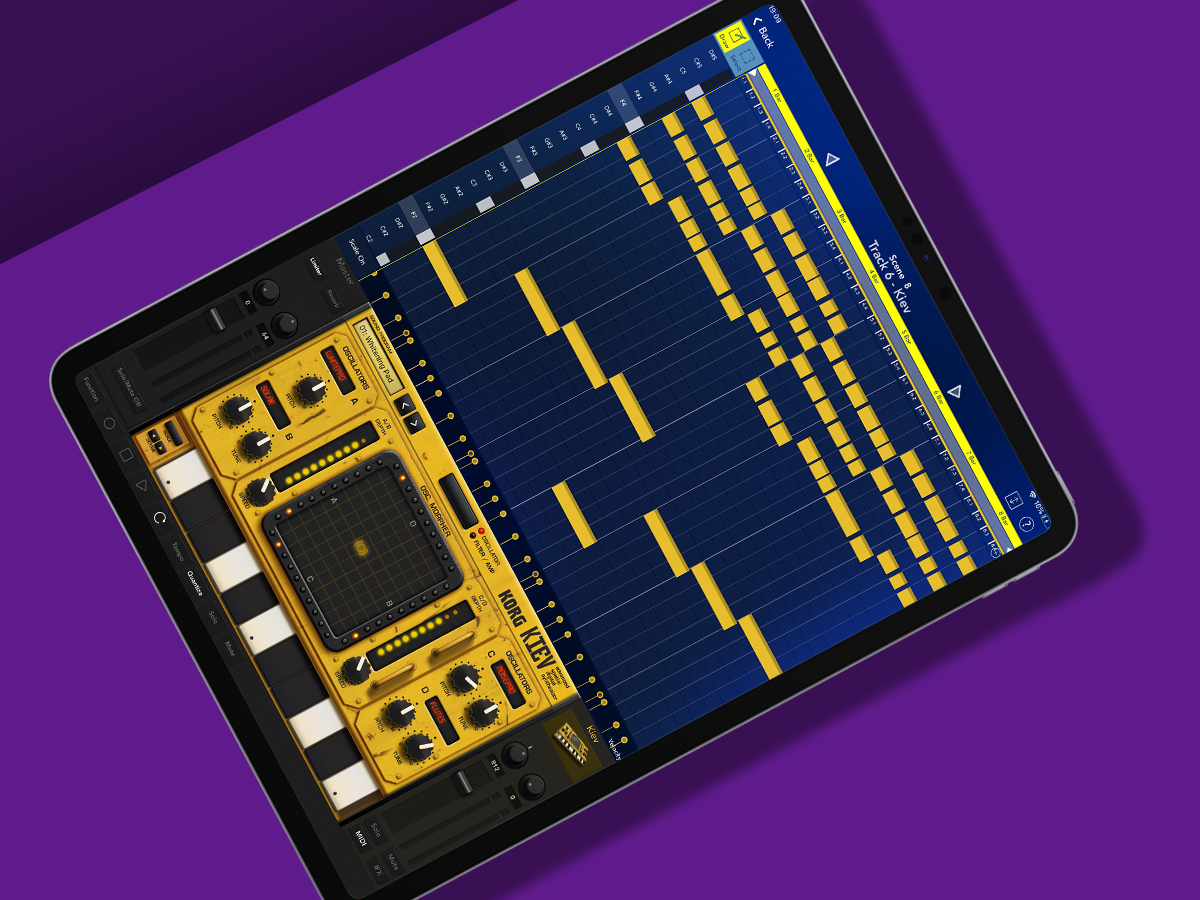
With over 20 miniature synths (‘gadgets’) and fantastic music production workflow, Korg Gadget is the king of music-making apps on iPhone and iPad. Each gadget has its own flavour, giving you anything from drum machines and delicate bells to monster bass and searing chip-tune screaches. Owners of Module, iM1 and other Korg apps can import their sounds as additional gadgets too. Bonus!
To lay down tracks, you record live or tap out notes on a piano roll. Your loops are then arranged into ‘scenes’, enabling you to construct entire songs in a manner that makes GarageBand’s equivalent features seem comparatively archaic. Gaudy interface aside, it’s superb.
Bandimal
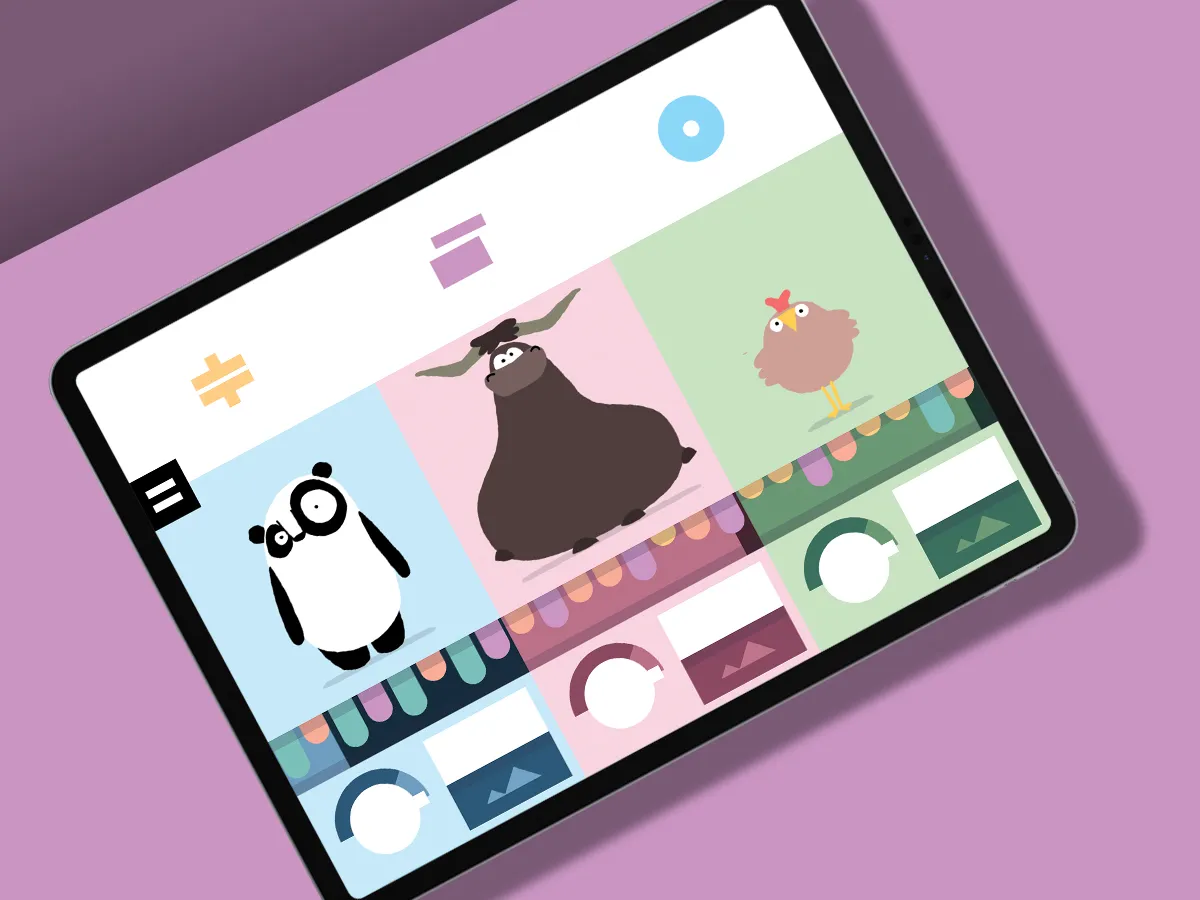
Bandimal’s App Store page claims it’s a music composer for kids. Don’t believe a word of it. Instead, Bandimal should be considered a colourful, bonkers, intuitive, entertaining way to make music, whatever your age.
The set-up’s basic: three tracks, on to which you tap out notes. Instruments are emitted from animals – everything from bass-belching whales to body-popping electro-pandas. You can add effects, fire up some drums and gleefully watch your trio of critters count in when loading one of your prior auto-saved compositions.
It’s not so much Crocodile Rock as an entire menagerie – and it’s wonderful.
Animoog Z Synthesizer
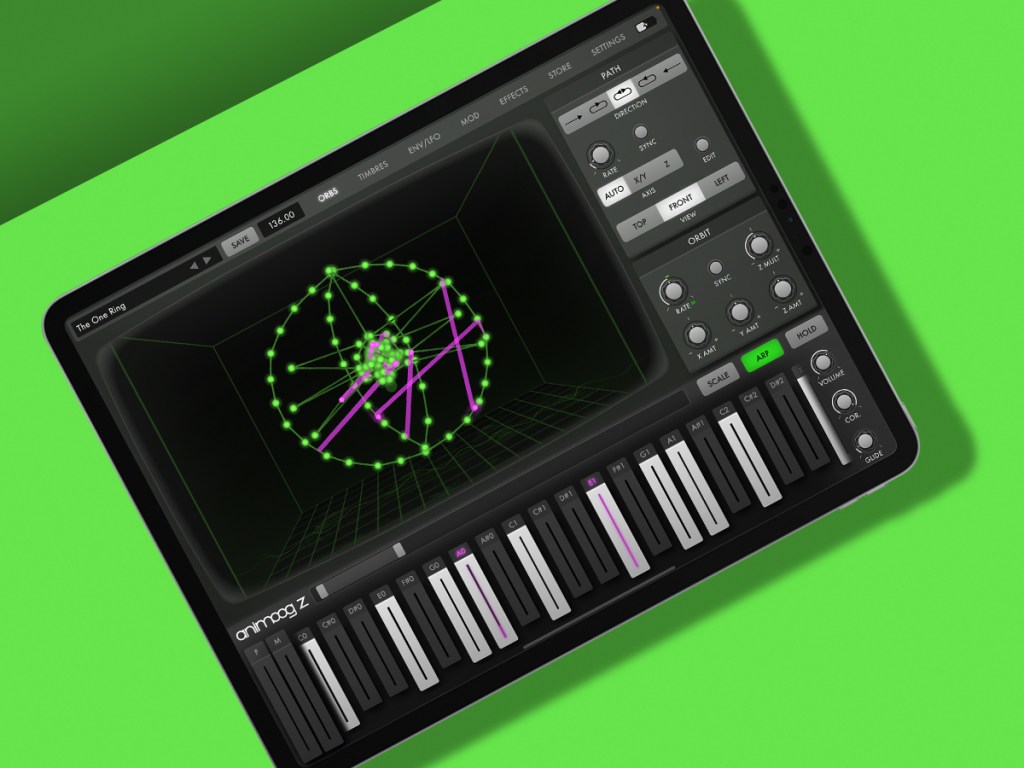
The original Animoog was an exciting vision of the future of synths, combining rich Moog sounds with a modern touchscreen interface that let you sculpt audio with your fingers. This follow-up takes things further and brings an added dimension.
We mean this broadly literally, since you can now navigate through the X, Y and Z axes of sound. As you play, lights zip around in the app’s visualiser, providing a treat for your eyes as well as your ears.
Even if you never pay up, the plethora of presets with the free version will keep you occupied for weeks. But splash out and you unlock the synth’s full pro-power, giving you knobs aplenty to twiddle as you dream of headlining Glasto.
Buy Animoog Z Synthesizer (free or $14.99/£14.99)
Samplebot
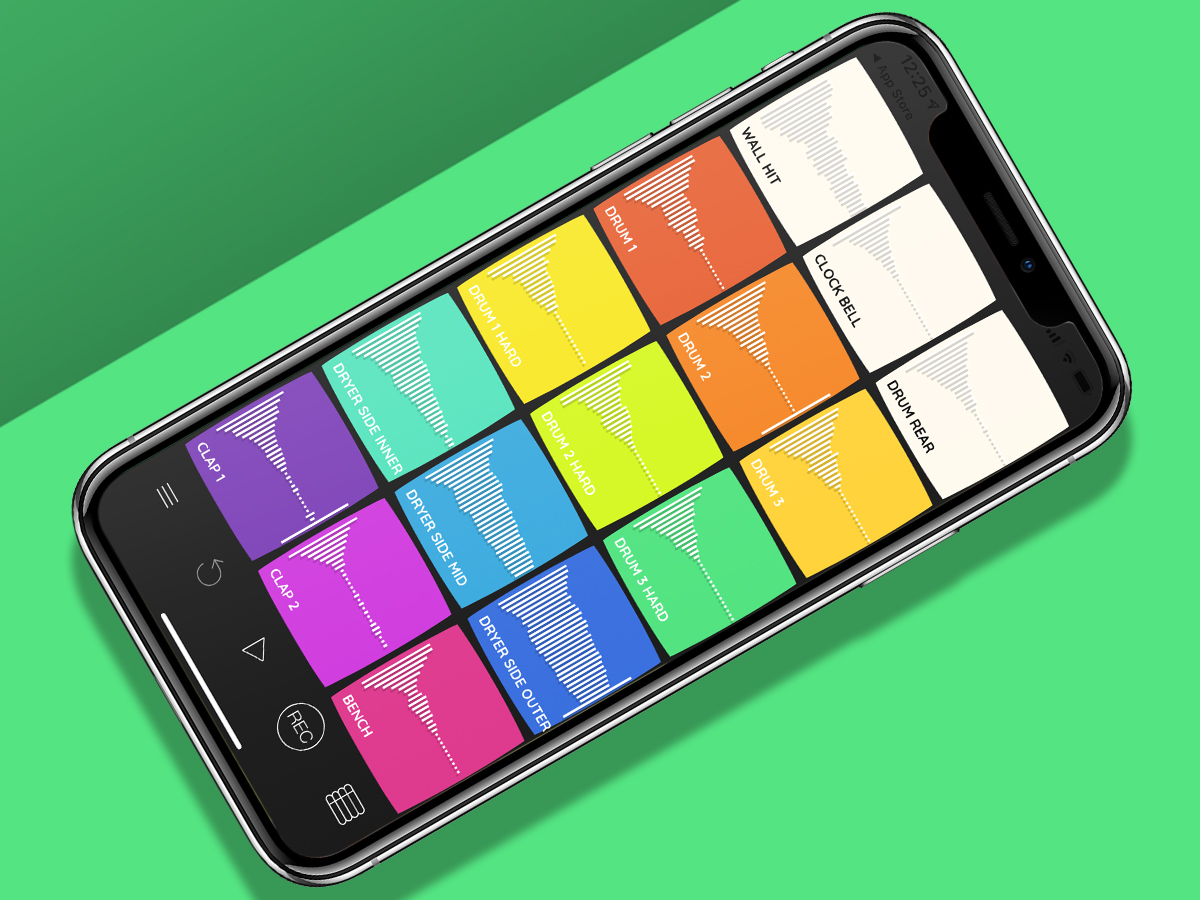
Get your robo-boogie on with Samplebot, which is all about making songs from whatever comes to hand. Using the app’s 15 pads, you can quickly record yourself smacking the living daylights out of pots and pans. The built-in sequencer then enables you to transform the cacophony into something approaching music.
Of a more musical bent? Then use Samplebot as a scratchpad, for sketching out ideas on the move without the distraction of a full-fledged music-creation app. You can even import samples from elsewhere or record snippets from other apps, if you feel beatboxing with your face doesn’t quite cut it when crafting a top-ten hit.
djay
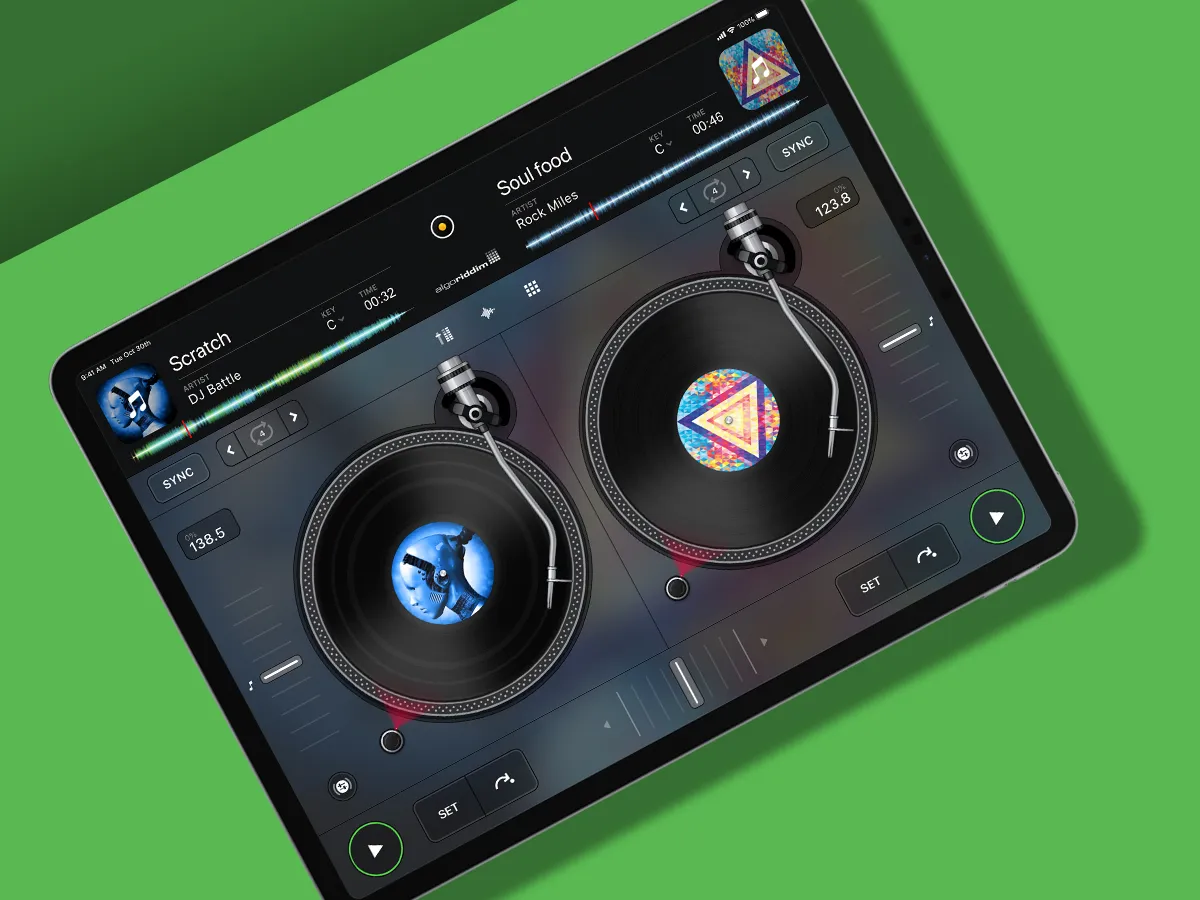
Should you be in the mood to spin some virtual decks, djay provides some seriously powerful features for getting an audience (or just yourself) leaping about like a loon.
You get four decks, video support, and a slew of buttons and sliders for all kinds of things. You can mix with jog wheels or delve into waveforms, adding sync and cue points. Effects can be applied using X-Y pads, and if you’re feeling lazy, sync buttons will make the app deal with tricky beat-matching.
On iPhone, this is all admittedly fiddly (if wildly impressive on such a tiny device), but on an iPad Pro, djay is almost good enough to make you fling your decks in the bin. The one snag: you’ll need to keep paying a subscription for those lovely pro features…
The best iPhone and iPad home life apps
Longplay

You might like the idea of turning your entire music collection into a giant jukebox, playing thousands of tracks on shuffle. But for people who still love the notion of putting on an entire album, Longplay is heaven.
The app presents your collection as a grid of covers you can arrange in various ways (including ‘recency’ and ‘negligence’). Prod one and the album plays. Easy.
Version 2.0 erodes the app’s original opinionated nature a touch, in providing a track list, so you can jump to a favourite song. But it also includes a fantastic randomiser; and the settings now also have an album shuffle option, for endless longplay bliss.
CARROT Weather 5

Plenty of weather apps are informative and beautiful, but only CARROT is snarky. The AI that sends forecasts your way’s gone a bit HAL, making threats, laughing when it’s pouring down outside, and hoping you get embarrassing tan-lines when it’s sunny.
Fortunately, the app’s useful too – packed full of colourful forecasts, accessible data, widgets that are actually good, and a ton of customisation – including a full layout builder. It’s also a rare iPad weather app that feels like the creator cares about how app layouts work on a tablet. Version 5’s three-column option makes your slate feel like a portable weather station.
The only drawback is CARROT’s subscription being a bit wallet-thumpy if you go for a top tier. Otherwise we’re one with the snark – although admittedly in part because we’re scared CARROT will kill us in our sleep.
Cs Music Player
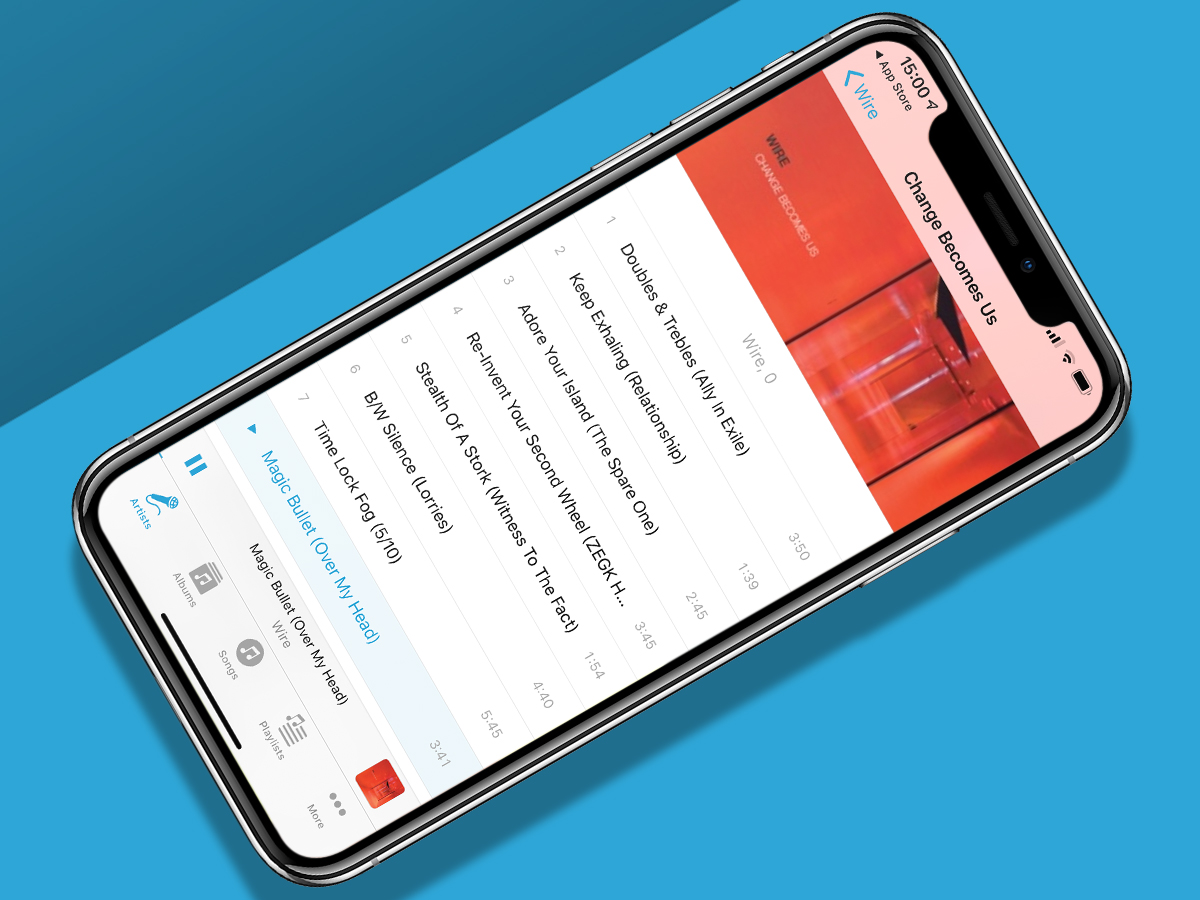
Apple’s own Music app evolved from an elegant and simple player into an app that may as well have a photo of Tim Cook glaring menacingly at you if you’re not signed up to Apple Music. Its relative complexity and the manner in which it sidelines your own music is irksome.
So we’re thrilled Cs Music Player exists, marrying an old-school player with modern iOS/iPadOS design smarts. The result is a breath of fresh air, providing speedy access to artists, albums, songs and playlists. It’s a straightforward, intuitive app that’s an excellent purchase, whether you’re syncing songs to your iPhone or iPad or just want a better way to play your iCloud Music Library.
Music Tracker
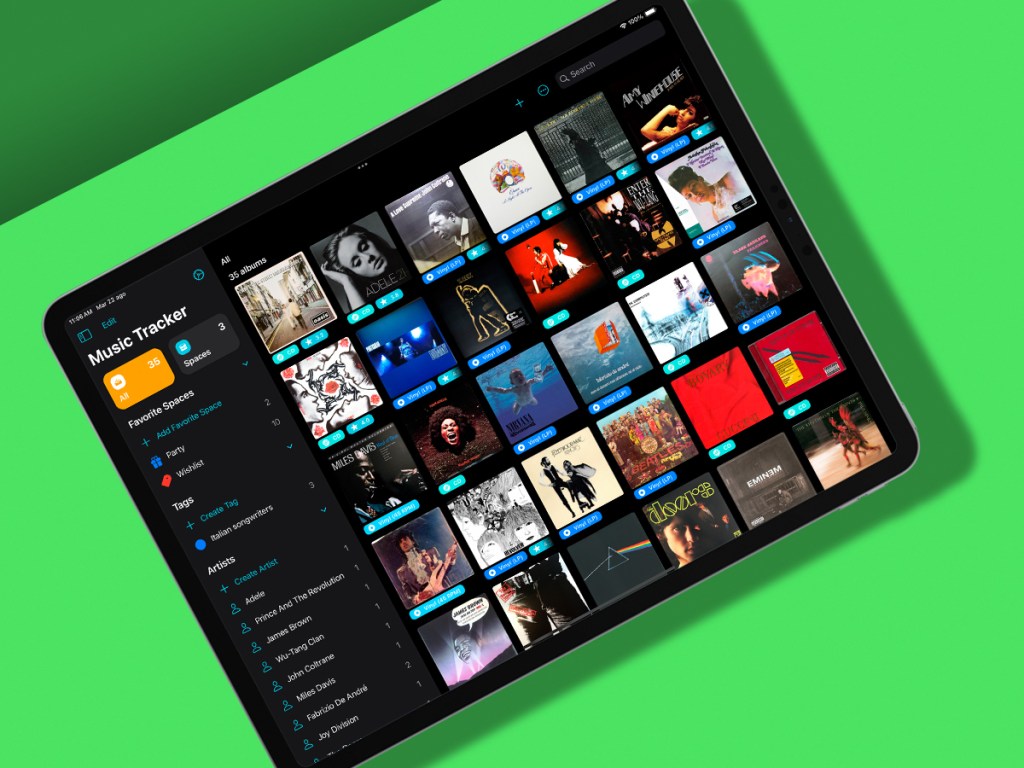
If you love gadgets but are resolutely old-school when it comes to music, this app helps you keep tabs on your collection of shiny discs and vinyl.
Like sibling app Book Tracker, it’s a joy to use. You can blaze through your collection by scanning bar codes, add records by way of manual search, or – amusingly – blast a song from your speakers and have Shazam identify its parent album.
Once your collection’s accounted for, you can use tags and spaces to organise it, save lyrics as quotes, and spray your Home Screen with widgets to quickly access favourites. Plus, if you often lose cherished records to ‘friends’, the app will even help you track loans, so you won’t have to buy that fifth copy of Phil Collins … Hits.
Buy Music Tracker ($1.49/99p per month, $10.99/£9.99 per year or $34.99/£34.99 lifetime)
Infuse 8
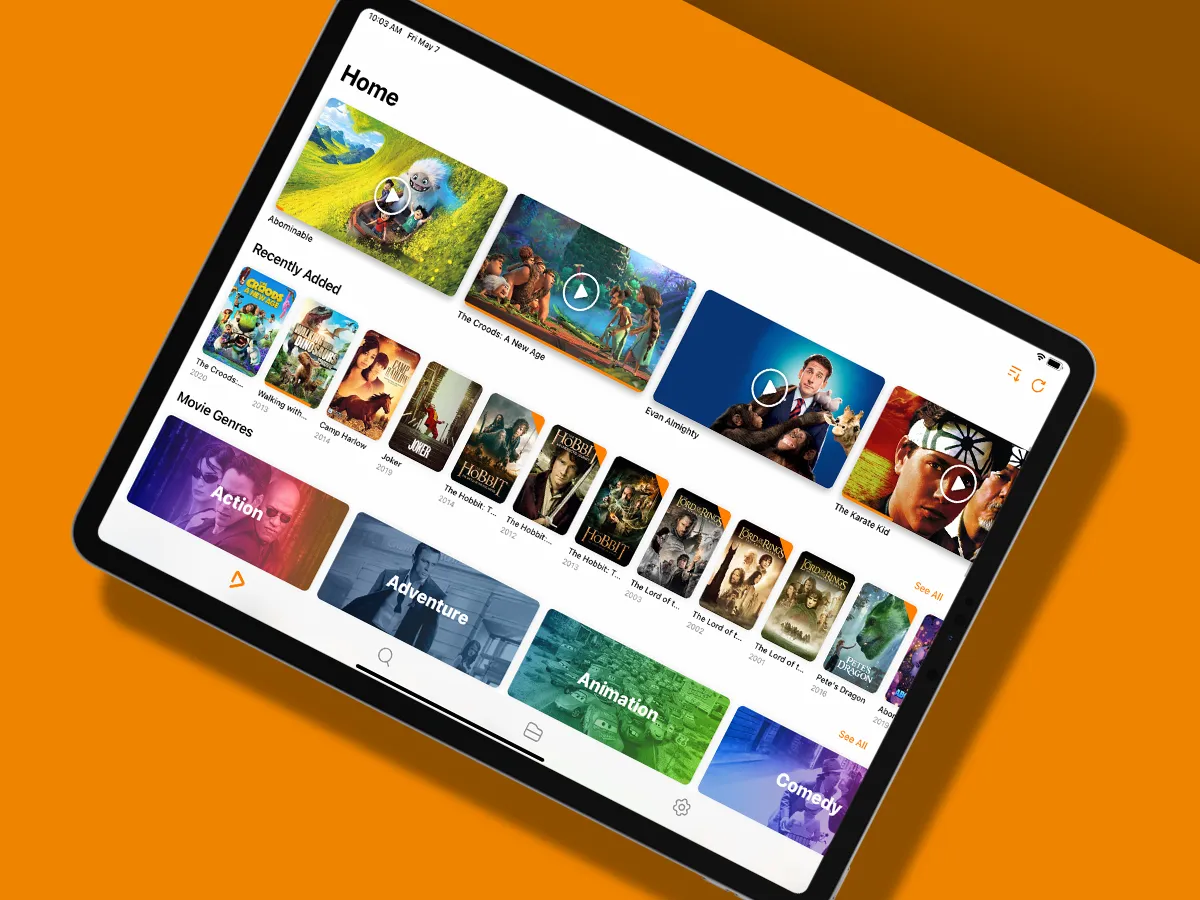
If you’re more of a collector than a streamer when it comes to video, you’ve probably got a load of files stashed away on local network drives and cloud storage. Should you want to get them playing on an iPhone or iPad, Infuse is a must. This app will delve into folders, live-convert videos when it needs to, and even grab cover art and subtitle files.
There’s support for local downloads, streaming to your telly by way of AirPlay and Google Cast, cloud sync to keep your place across devices, and even DVD file support, so you needn’t bother converting old DVD rips to MKV or MP4. If you’re feeling a bit cheap, you can avoid paying entirely, although that means you’ll miss some key features (sync; cloud library support; streaming over AirPlay/Google Cast). Otherwise, splash out for a subscription.
Buy Infuse (free or $1.99/£1.99 per month, $12.99/£12.99 per year or $99.99/£99.99 lifetime)
Book Tracker
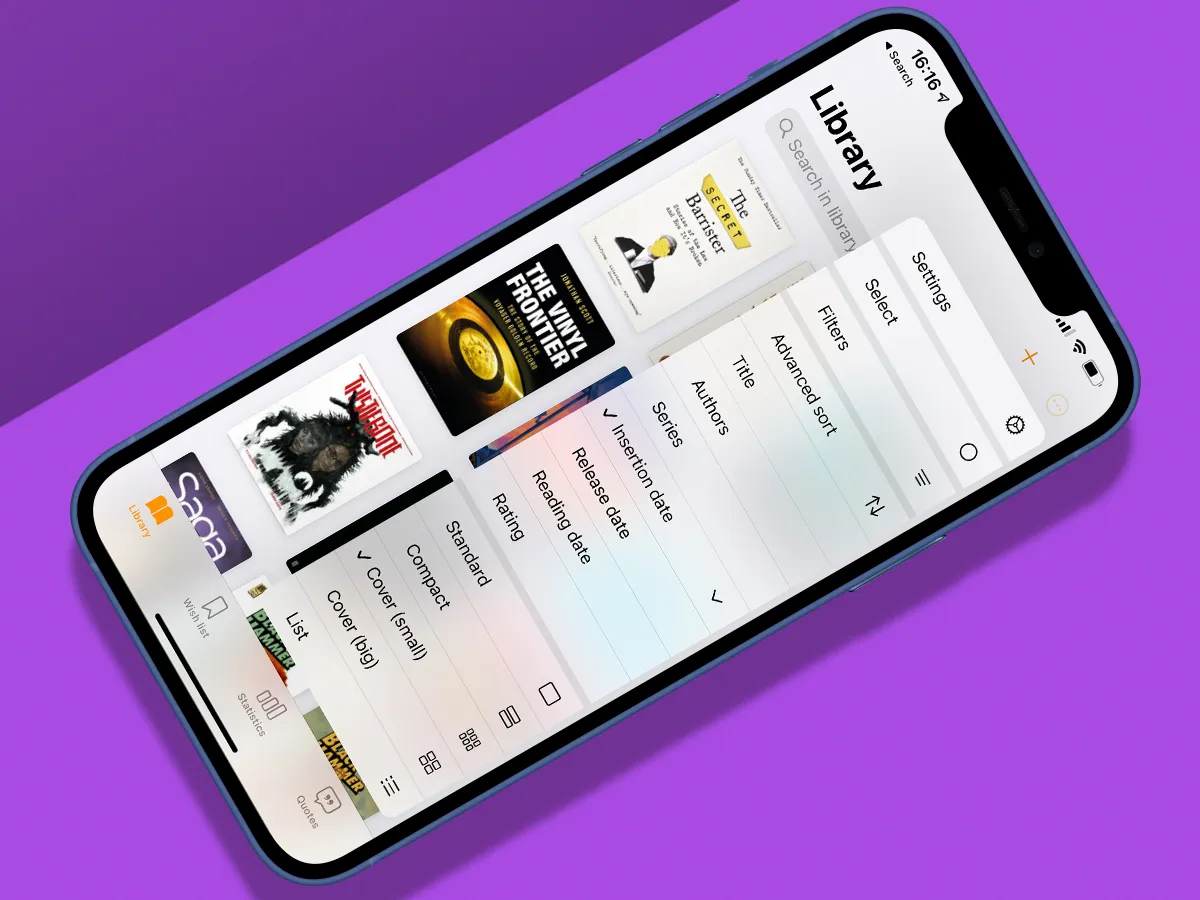
All those books you have lying around aren’t going to read themselves. But rather than glancing guiltily at the piles, get organised with Book Tracker. Scan in your tomes – or use the built-in search to add titles from a browser – and you can keep tabs on your collection. Then you can use the app to track your reading – and more.
With each title, you can set which page you’re up to, and dig into statistics to see how much you’re reading on a daily basis. Favourite quotes can be saved, and you can record when you loan books to friends. The app’s wish list gives you a place to stash books you’d like to buy as well – once you’ve got through some of those you already own first, of course.
Ketchup for Pokémon

If your brain’s so tired juggling facts when playing Pokémon games that you want to hurl your console into a hedge, Ketchup could be the answer. It lets you dig into a raft of facts about the original 151 critters – and many more if you stump up for the one-off IAP. You can track creatures you’ve caught, test your knowledge with a daily quiz, and use a type calculator to boost your chances in battle.
But where Ketchup really excels over dusty paper tomes (and competing apps) is with its superb design. There are neat touches everywhere, such as background tints that match creature colours, a superb search tab on iPhone that when dragged upwards reveals recent searches, and the type calculator’s dial navigation, borrowed from the creator’s own Obscura camera. It’s a perfect companion to your console – or Delta on iPhone.
Buy Ketchup for Pokémon (free or $14.99/£14.99)
The best iPhone and iPad health and wellbeing apps
Mela
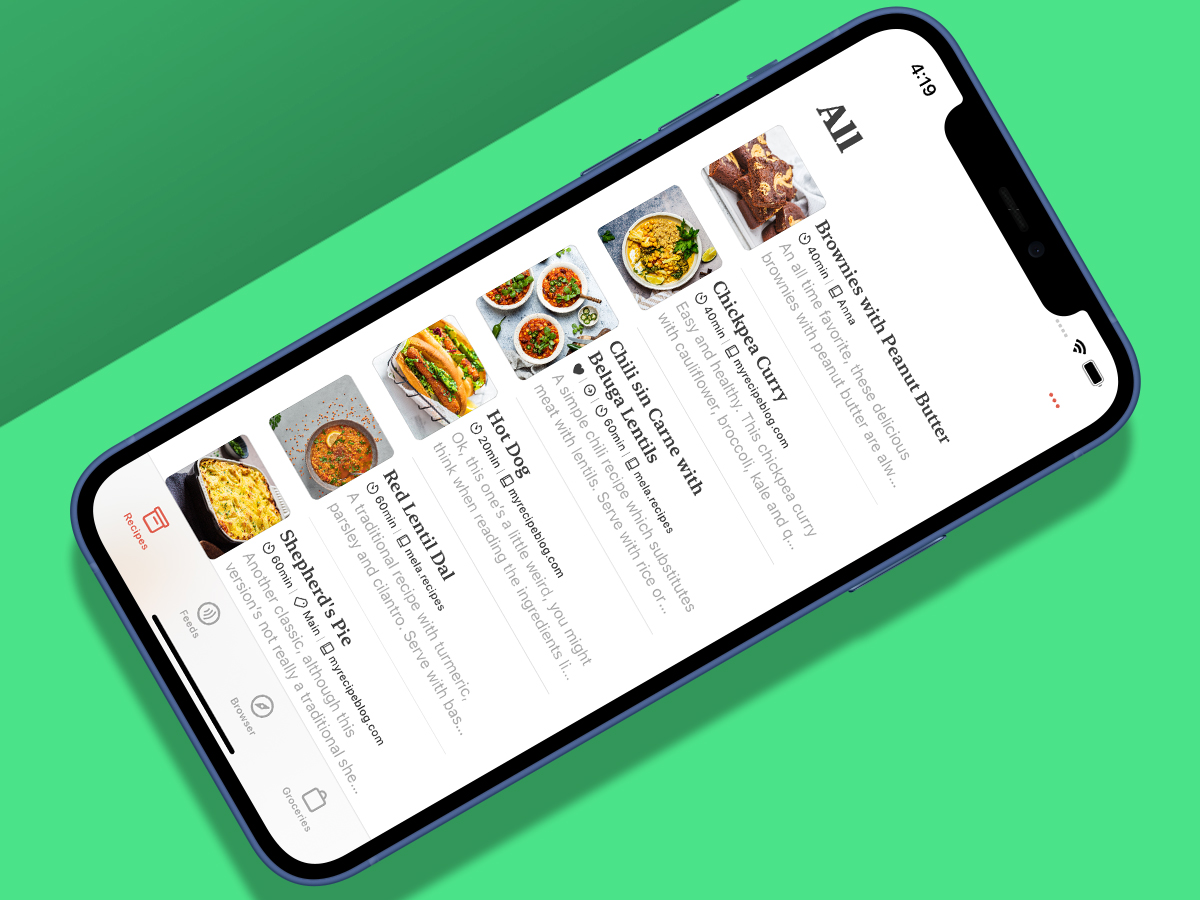
Tired of making the same old dishes? Annoyed that cookbooks don’t feel written specifically for you? Mela deftly deals with such issues by combining a recipe manager with RSS. (Mela’s developer has form in this space, having created RSS client Reeder – see box.)
This means although you can use a built-in browser to visit favourite sites, clipping and editing recipes to add to your growing collection, you can also subscribe to recipe website feeds. On a daily basis, you’ll get loads of new ideas from favourite sources, for zero effort.
Venture into the real world and Mela can help there too, whether by scanning recipes from paper tomes or by populating Reminders with ingredients for whatever you fancy making next. Sadly, it won’t do the actual cooking for you – but perhaps Apple CEO Tim Cook has an iCook waiting in the wings.
Portal – Immersive Escapes

There are loads of great ambient noise apps for iPhone and iPad, but Portal takes things a step further with the addition of visuals. The idea is to transport you to idyllic locations, providing a more holistic way to relax.
It’s effective – especially if you have an iPad. Having a little window to another world – and a far more tranquil one than the one you otherwise exist in – on your desk can prove to be a calming experience.
The variety on offer in the full app (which, natch, requires a fairly hefty annual fee) is welcome too, letting you zip between, for example, blissing out on a beach, immersing yourself in an Amazonian thunderstorm or gawping at a starry night sky.
Buy Portal – Immersive Escapes (free + subscription IAP)
White Noise+
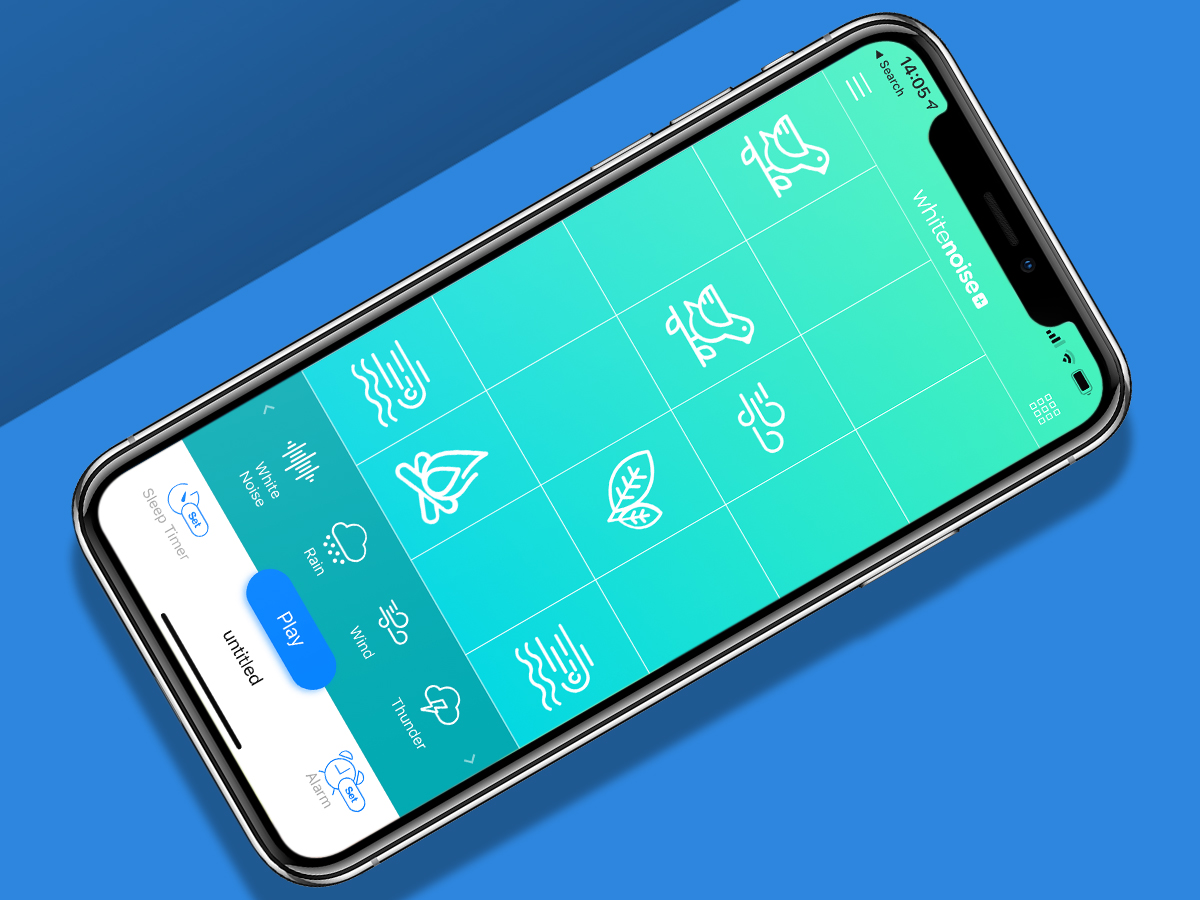
A lot of wellbeing apps go a bit overboard with pastel colours and endless imagery of perfectly toned people smiling on beaches. White Noise+ has no interest in such fluff, instead offering a minimal, modern interface for creating your own ambient sound mixes.
In short, you get a grid, to which you drag icons. Those towards the top and right, respectively, play louder and with added complexity. You can try the app for free, for which you get white noise, rain, wind, thunder and wind chimes. But pay the IAP and you get every sound unlocked, a sleep timer, and the peace of mind that comes from supporting a great app.
Streaks Workout
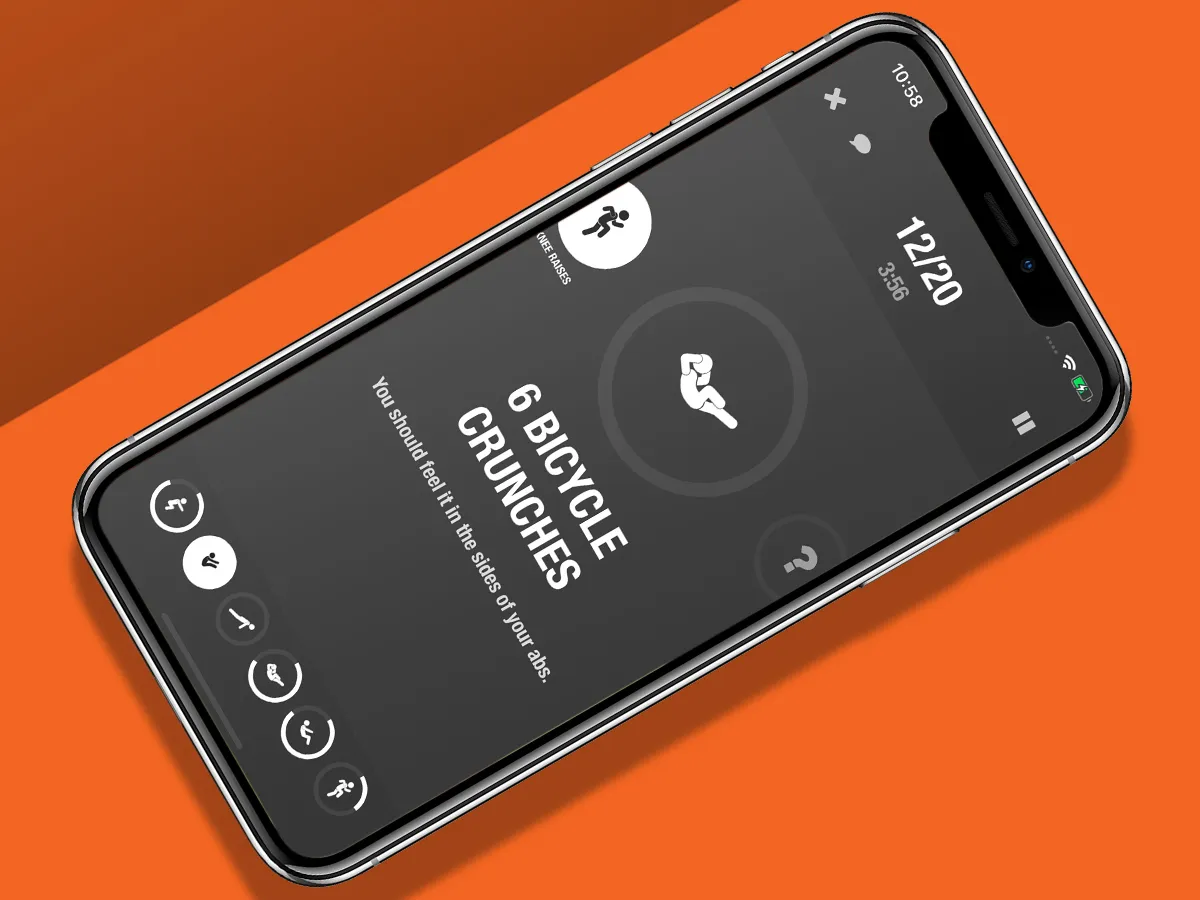
If the idea of going outside to exercise fills you with dread, you may have chanced upon indoor personal training apps. But sometimes they try and contort you into strange shapes, or make you exercise with a chair, like you’re starring in a baffling furniture-oriented round of Strictly.
Streaks Workout smacks the excuses out of you, shortly before punching your energy reserves in the face. You get 18 equipment-free exercises to toggle, which are then hurled at you randomly throughout your routine. Stats are logged and tips are offered – but be aware that the 30-minute routine is called ‘pain’ for good reason.
Buy Streaks Workout ($4.99/£4.99)
Habit-inducing: Streaks
Sister app to Streaks Workout, Streaks ($5.99/£5.99) is all about forming good habits, whether that’s actually doing your exercises, eating well, taking breaks or quitting something that’s bad for you. The bold interface is designed to make you focus on a small number of daily wins, which means it never overwhelms. Now you’ve no excuse for forgetting to walk the dog.
The best iPhone and iPad writing apps
iA Writer

This plain text editor starts off looking simple to the degree you might view the price tag with suspicion. At its most minimal, it’s just you, a blank canvas and a cursor, as you hammer out words. But what makes iA Writer essential for iPad-based writers is its depth and customisation.
As of version 6, you get an optional split view mode on iPad, for a live preview of your markdown. You can save all your work to iCloud and link documents. There’s a ‘Lightning’ menu to surface favourite commands, integrated document metadata with variables, and blazing fast library navigation.
You might not need all those tools when smashing out copy. But you’ll be glad they exist at the point when you do.
Ulysses
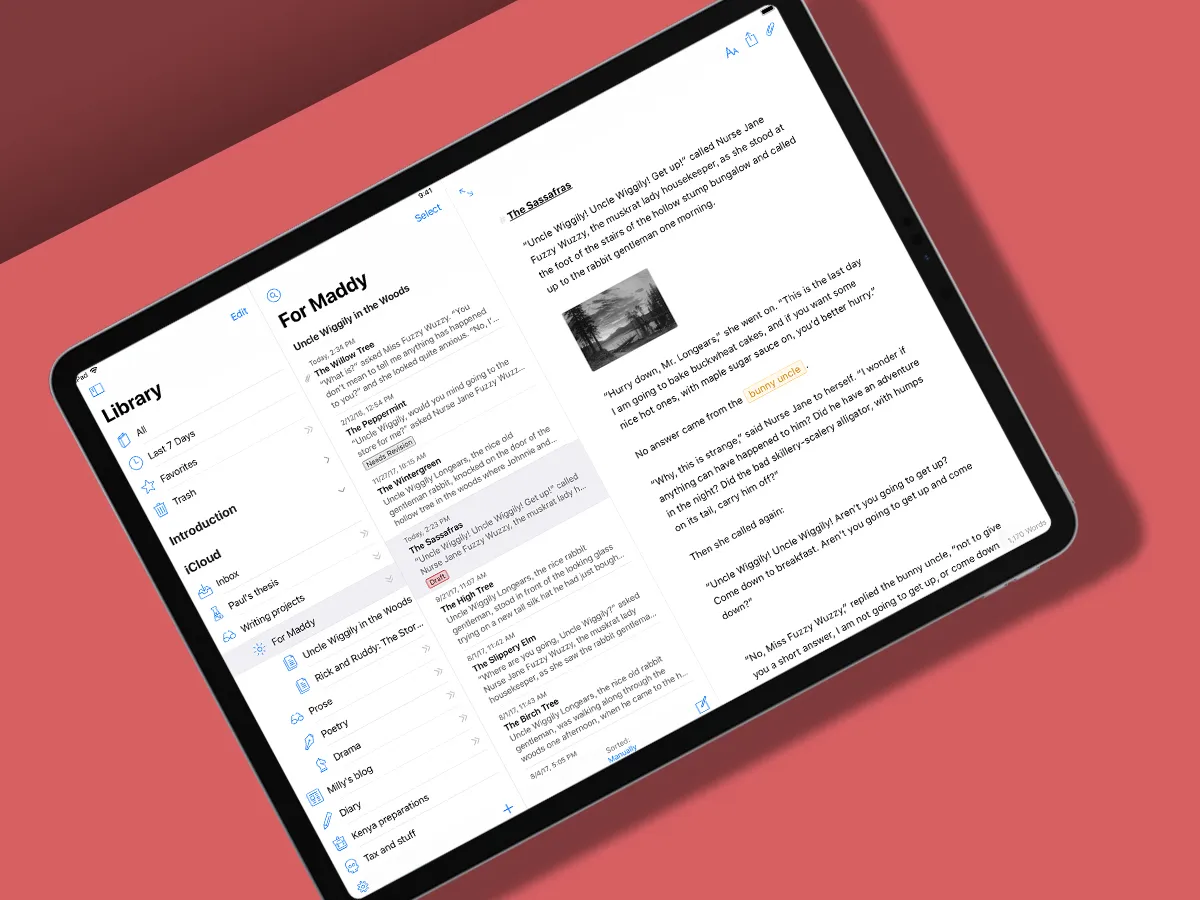
Popular desktop word processors feel like products from a bygone era. Increasingly, they try to be desktop publishing tools, full of complexity and suspicious clip art. Ulysses Mobile wants no truck with such things, stripping back writing to the important bit: words.
What you get here is a distraction-free writing environment that boosts efficiency. You can write in Markdown, stash, store and organise notes, and export whatever you write to a variety of formats. On iPad, it’s disarmingly similar to the equally excellent macOS app; and even on iPhone, Ulysses is usable enough to stab out a quick article with your thumbs. Naturally, iCloud syncs everything you write and stores it across devices.
Scrivener
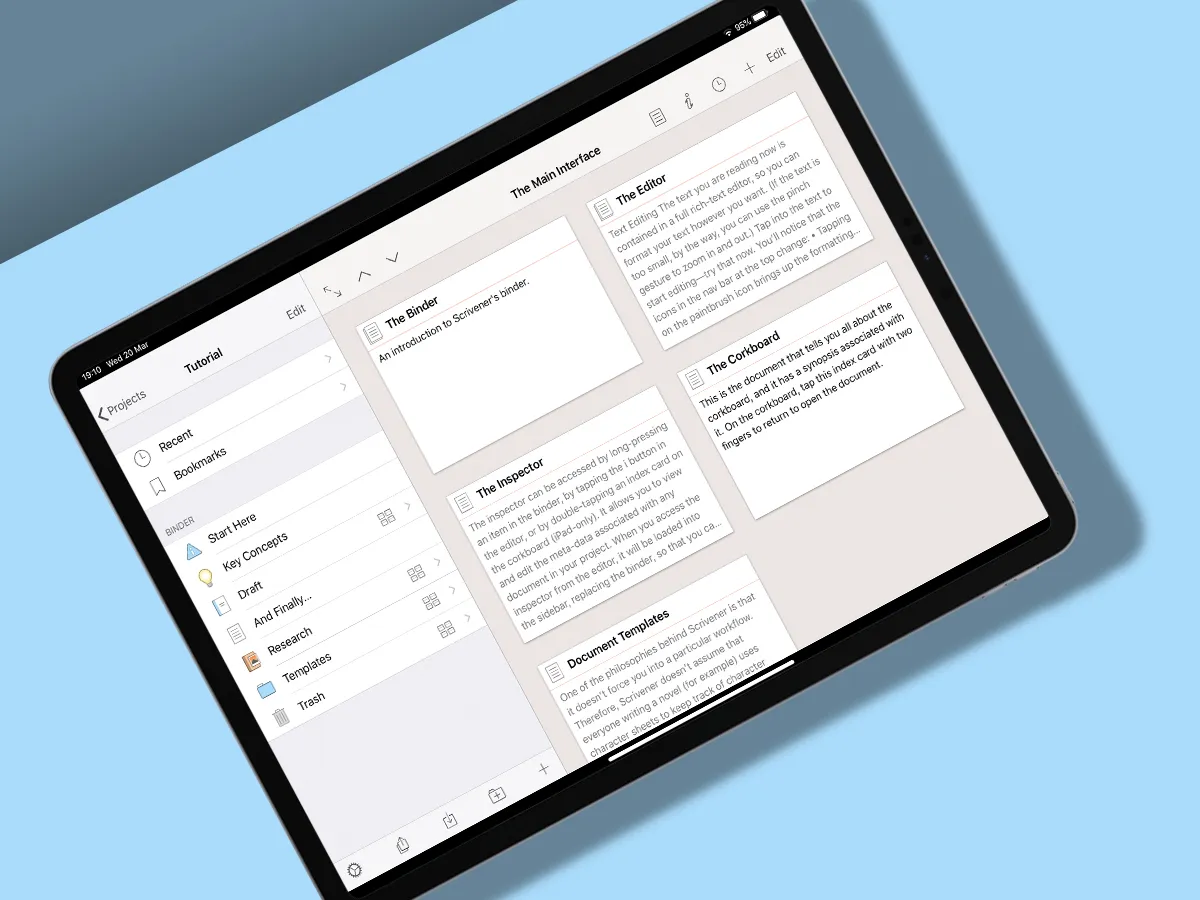
While Ulysses is excellent for notes, short articles, and working in Markdown, Scrivener has long been the darling of desktop users tasked with long-form writing – scripts, novels, never-ending corporate plans, and the like.
Astonishingly, the iPad incarnation mirrors its desktop cousin, providing a rich-text editing system that includes powerful organisation tools, research stashing, two-up display of research and writing, a ‘corkboard’ for shuffling synopses about, and robust export.
Sync is a touch clunky (the app locks you out while flinging projects to and from Dropbox), but otherwise Scrivener is one of those apps where you occasionally have to check you’re using an iPad and not a Mac or PC. And although we wouldn’t use it to write a novel on an iPhone, the slightly stripped-back Scrivener on Apple’s smartphone is surprisingly useable too.
Textastic
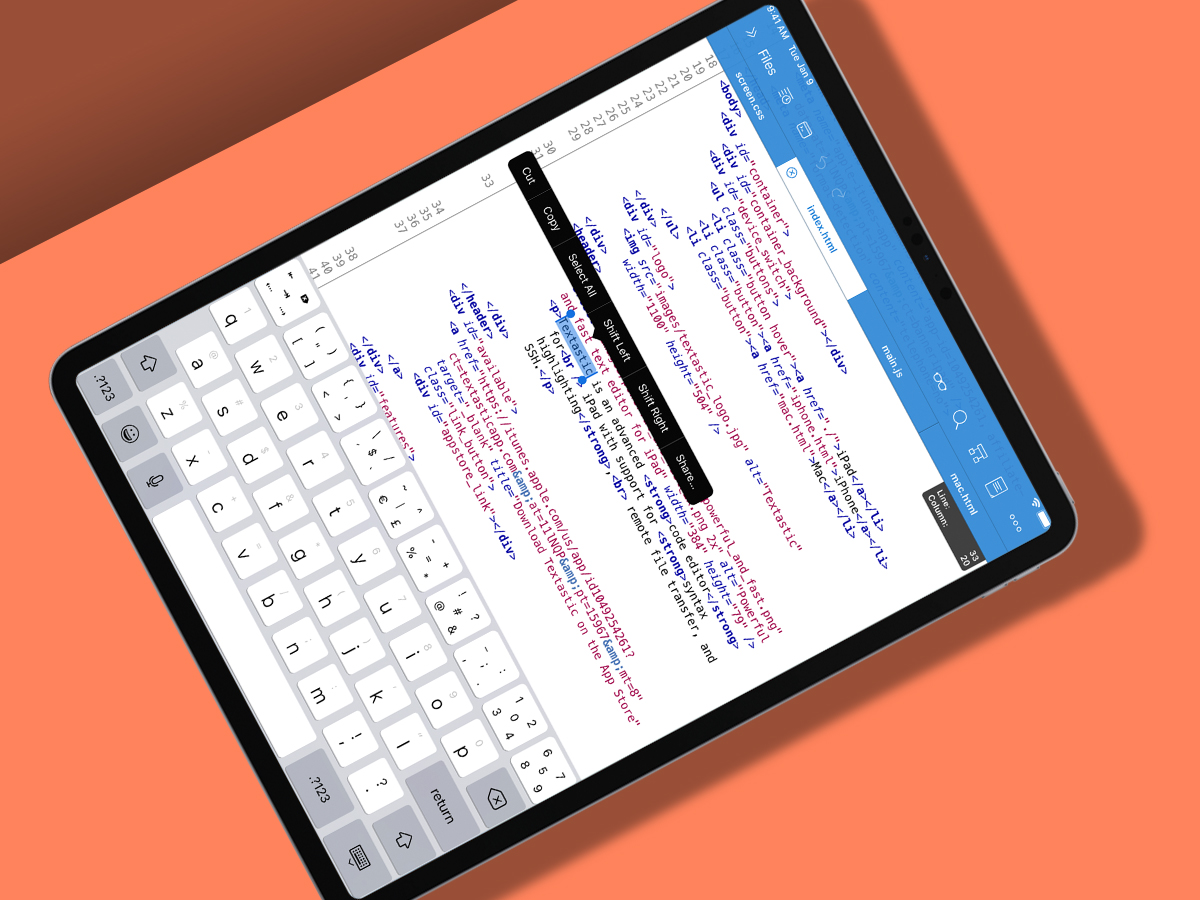
Do you write code rather than words? Then try Textastic, which knocks down another barrier to Apple devices replacing traditional computers, by giving you a full-fledged toolkit for when you’re on the move. The app includes a built-in file manager and SSH terminal, along with a robust text editor with syntax highlighting, powerful find/replace, and a smart keyboard row and configurable shortcuts for more rapidly tapping out lines of code.
On iPhone, this is a capable editor when you quickly need to tweak a website or other project and can’t get at your main workstation. But on an iPad, it’s transformative. Connect to Git repositories and servers, run it in Split View with Safari alongside, and you’re sorted.
PDF Expert
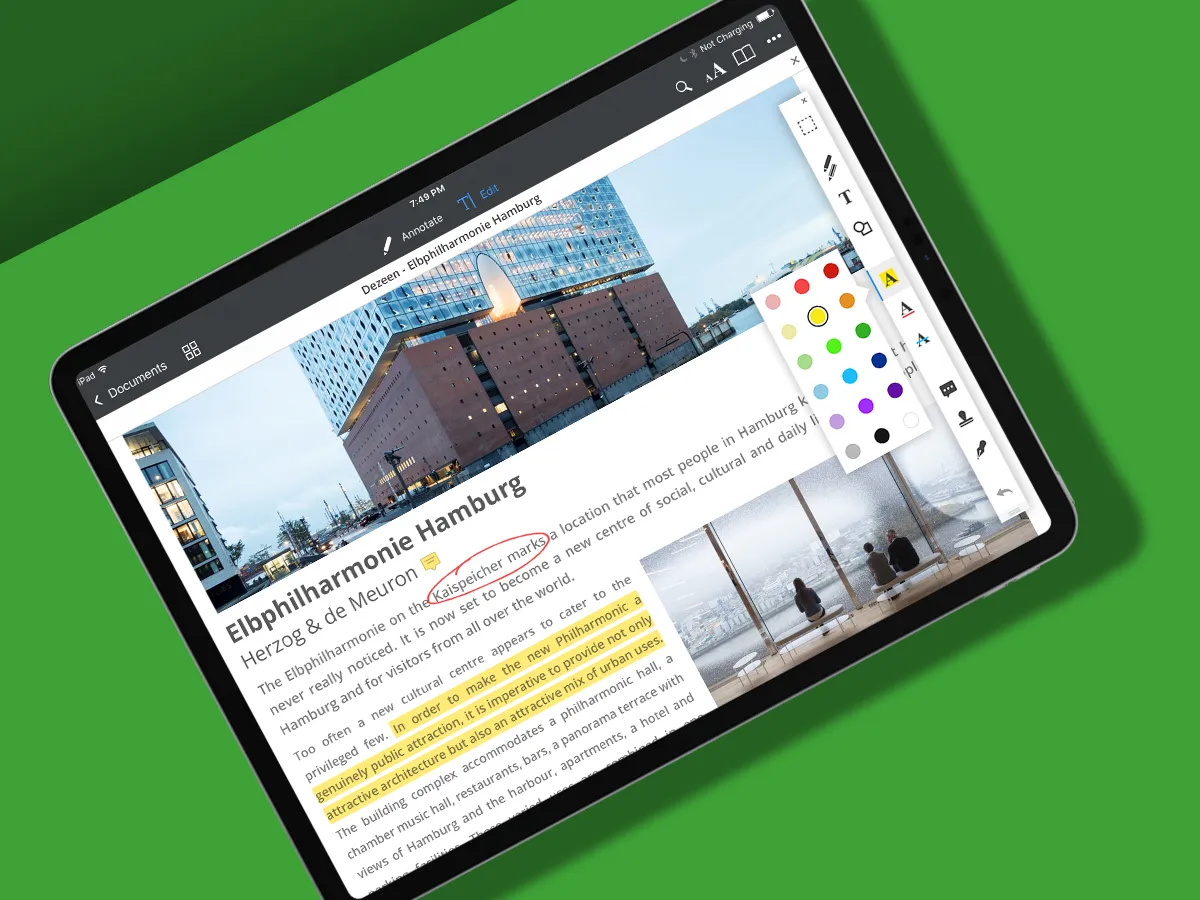
We’re not in particularly sexy territory with PDFs, but most people end up needing to fiddle around with them at some point. If that’s you and ‘some point’ is actually ‘all the damn time’, PDF Expert’s your app.
On the iPad, you can quickly and easily make annotations, sign documents, shift pages about, and fling the result in someone’s general direction. Grab the pro IAP and you can go further, directly updating text, replacing images, adding links, and redacting text like you’re some kind of government agent.
The best iPhone and iPad productivity apps
Croissant
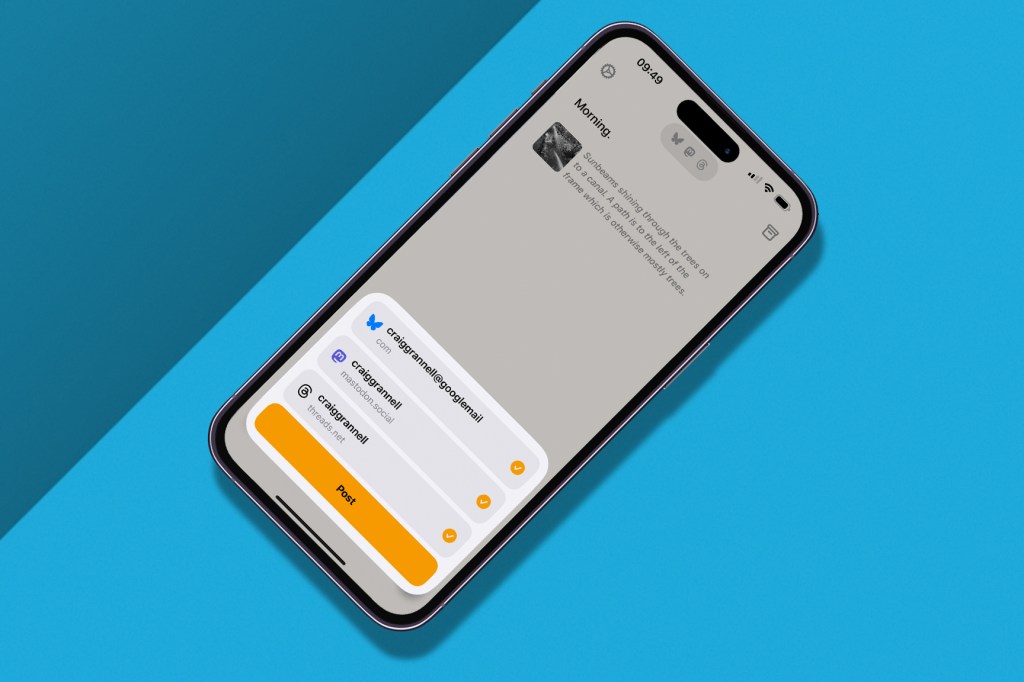
Threads. Bluesky. Mastodon. If you’ve made the great escape from X, chances are you and your friends are on one of them. Or all of them. And in the latter case, that’s where Croissant comes in, making it a cinch to blast your hot takes across three social networks with a single tap.
Before doing so, you can build threads, save drafts, load images, add alt text, and insert so many hashtags you run out of characters for anything else. And for each post, you decide if it really needs to hit every network.
The timeline-obsessed might grumble about Croissant being post-only, but, honestly, that’s a win. Post to social media without having to read any of it! Shout into the void without endlessly doomscrolling! Worth every penny.
Buy Croissant ($2.99/£2.99 per month or $19.99/£19.99 per year)
Dumb Phone
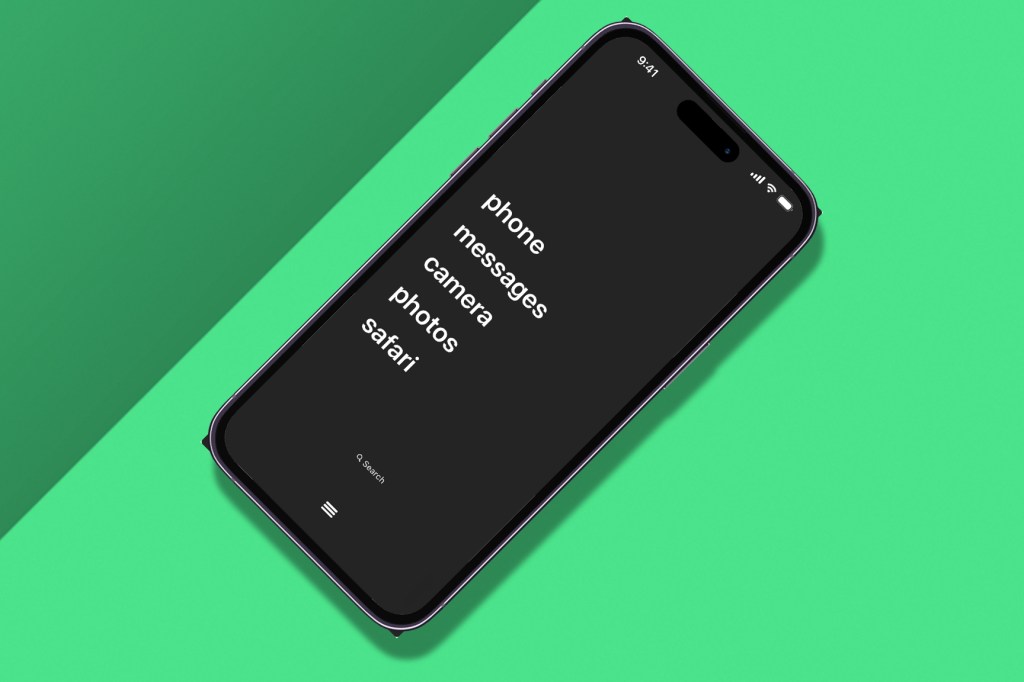
This one’s more a system for rethinking your Home Screen and dispensing with bad habits than an app. Within Dumb Phone itself, you create one or more widgets that contain large text-based links to your most important apps. Various fonts and styling options are available. You’re then instructed how to apply these to your iPhone.
At its most minimal, you can end up with a single black Home Screen with a half-dozen text links, forcing you to App Library or search to access anything else. It’s a psychological trick, but one that proves effective if you’re someone who’s often sucked into time-sapping apps by way of colourful icons. If you want to make your iPhone use more meaningful and intentional, Dumb Phone is well worth checking out.
Buy Dumb Phone ($9.99/£9.99 per year or $24.99/£24.99 lifetime)
iPulse
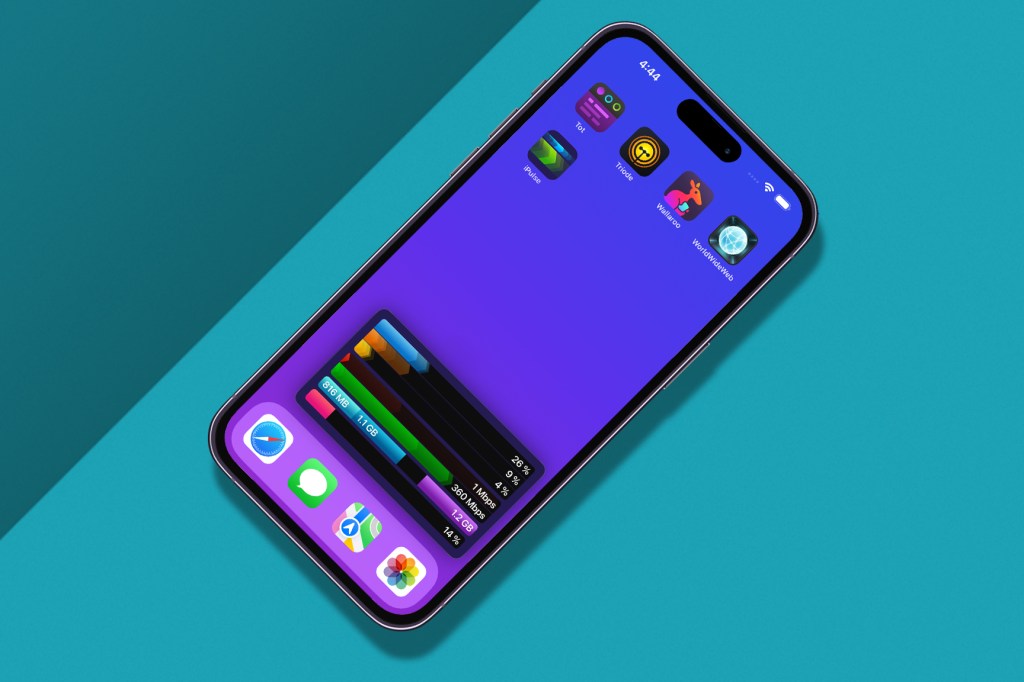
Your iPhone (or iPad) is a closed box. But iPulse gives you a glimpse of its inner workings, by way of bar charts. The app provides live readouts for processor and network usage, along with memory allocation and how much storage you have left, the last of which tends to be more accurate than Apple’s own info in Settings.
The clever bit is you don’t need to be in the iPulse app for any of this. Tap a button and the graphs are loaded into a picture-in-picture view, which sits atop other apps and can be resized or stashed.
It’s an ingenious solution and just the thing to sanity check how much of your device’s power pro-grade apps need – or stare aghast as the bars shoot up whenever you’ve the audacity to download something from the App Store.
Soulver

A revolutionary aspect of the original iPhone – and by extension, iPad – was how the touchscreen allowed the device to ‘become’ anything. It still is. Mostly, apps echo real-world tools, but Soulver 3 takes a more inventive route and casually rethinks the calculator.
Specifically, it fuses a calculator with a notepad, so you can integrate figures with text. This lets you add context and tot up sums using natural language. Dig deeper and you’ll discover how to fashion complex interconnected calculations across multiple lines – as if using a friendly spreadsheet, or the back of a magic envelope where your scribbles automatically resolve.
With iCloud sync, Mac Soulver feature parity, and iPad-friendly Slide Over support, Soulver 3 is a must-have you’ll use often.
Buy Soulver (free + $14/£14 for iPhone and/or $20/£20 for iPad)
Fantastical
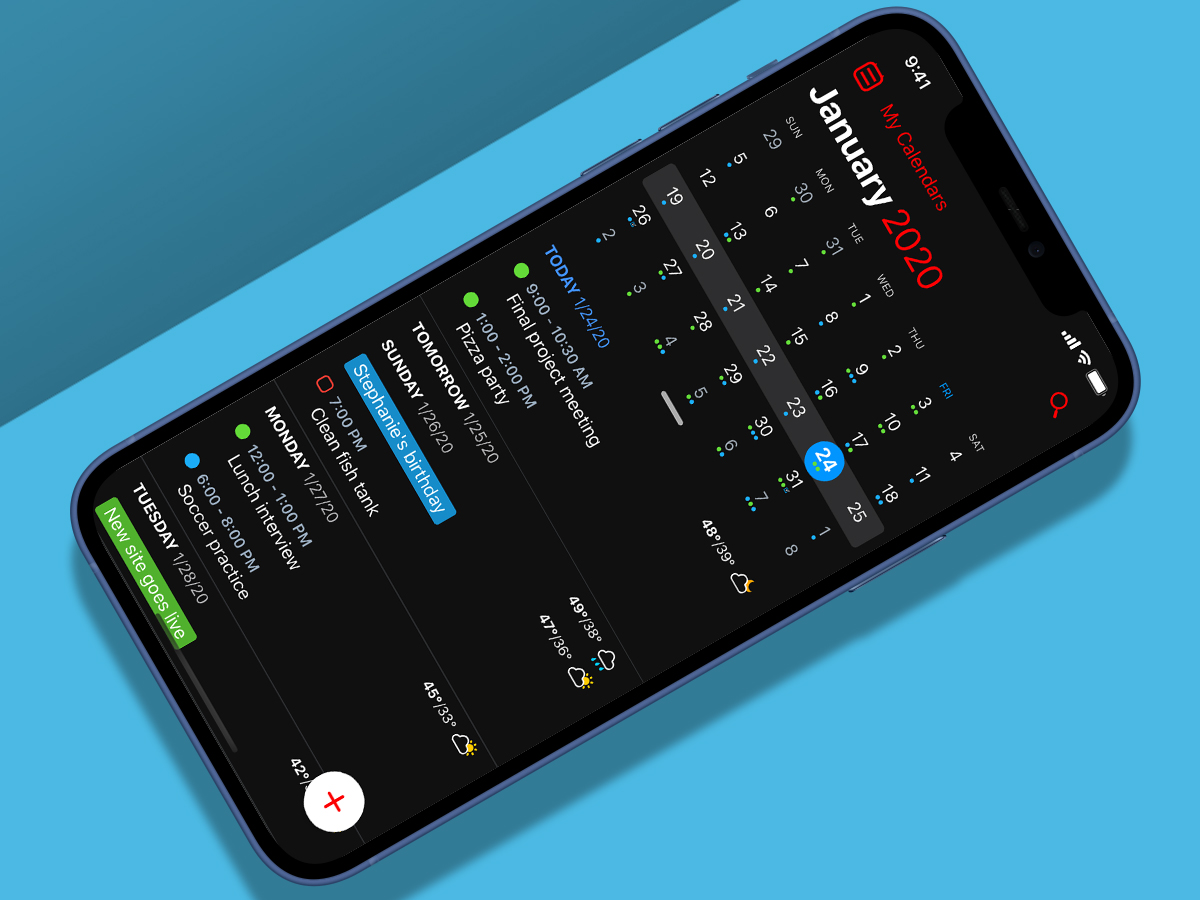
It doesn’t matter what size Apple device you plump for, the Calendar and Reminders apps are going to be mediocre. You’re better off replacing them with Fantastical, which boasts an infinite scrolling events ticker twinned with a month calendar for quickly snapping the list to specific dates. On iPad, the extra space nets you a full calendar view next to the ticker. Lovely.
Regardless of your device, though, this app hugely impresses with its natural-language smarts, accurately interpreting your input (such as ‘Team lunch on Friday at 12 for two hours’), building your event as you type. Beyond that, there’s other clever stuff, including integrated weather forecasts, smart meeting organisation, and calendars based around telly, holidays and sports.
Furry focussed: Bear Focus Timer
It’s easy to get distracted during your working day. Bear Focus Timer ($1.99/£1.99) keeps you on track by splitting your time into work/rest sprints. Place your phone face down to start the timer – a nice psychological trick that puts your device ‘out of reach’. Pick it up before a break and the bear growls at you.
1Blocker
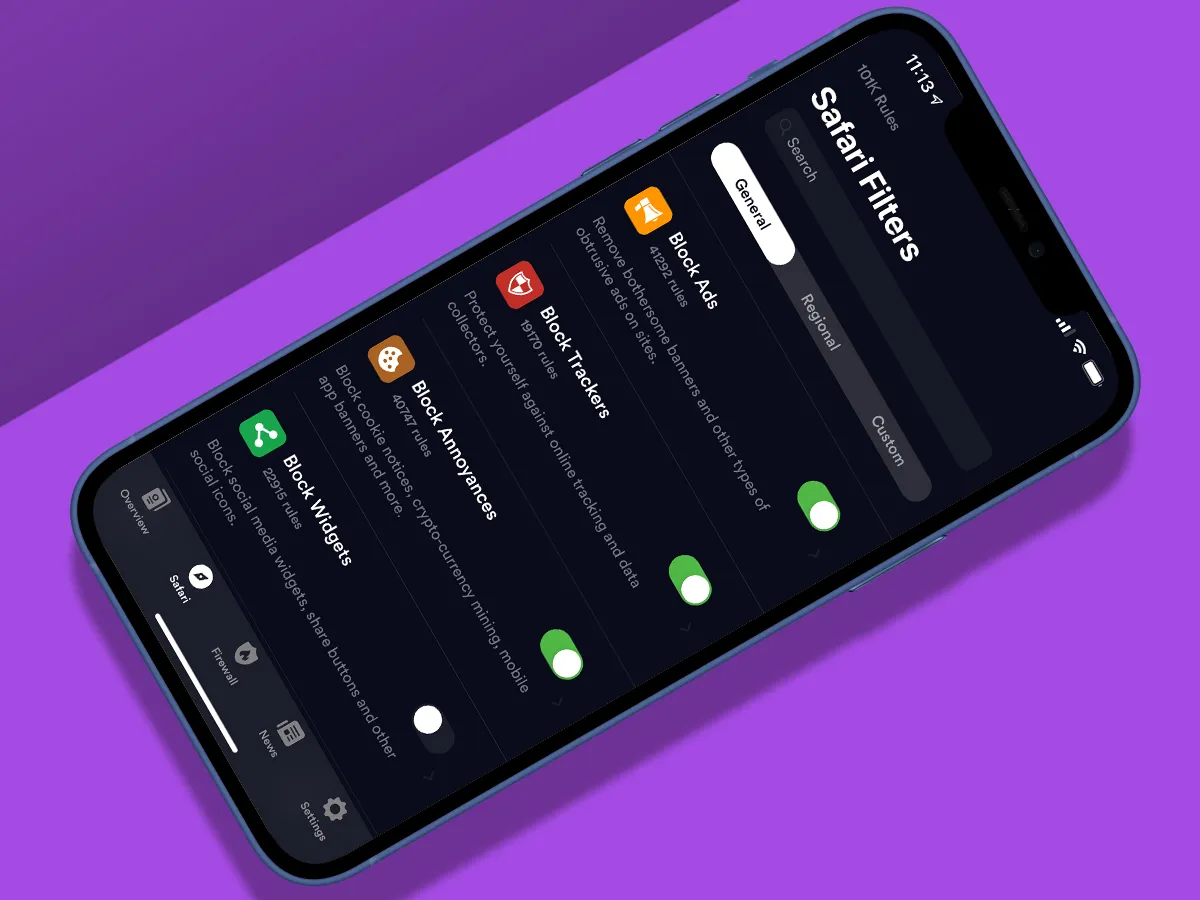
The internet is full of cruft. 1Blocker lets you eradicate bits that annoy you – assuming you cough up 15 quid a year. Still, for that outlay, you can block ads, trackers and obtrusive elements like cookie notices, widgets and comments. An additional optional firewall provides further protection against tracking.
1Blocker is no blunt instrument, though. Head to the Custom tab and you can tweak all the settings. This might mean whitelisting websites you don’t want to deprive of ad revenue, hiding specific web page elements, and downloading pre-made rule sets to fine-tune how sites behave. In short, the app tames the worst excesses of the internet, making browsing a pleasurable experience once again.
MindNode Next
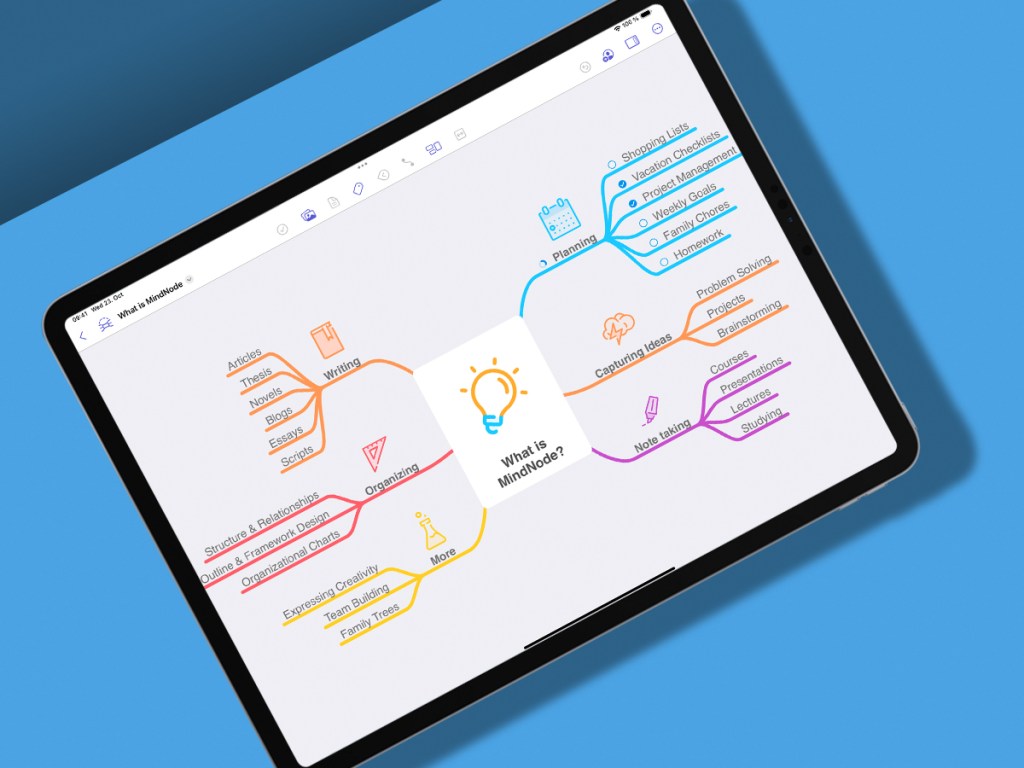
We’re doffing our ‘business’ hat for this entry, given that the idea of mind-mapping usually evokes thoughts of conference rooms and wanting to drown yourself in a vat of coffee just to escape endless meeting hell.
But wait, because MindNode is really lovely to use, and fantastic for sketching out ideas about almost anything. You place your idea in the middle of the screen, and grow it from there, adding pathways, images and icons, styling everything, and finally exporting your creation. And when you have to get properly corporate, there’s even an editable outliner and a vertical mode for org charts. (Where’s that coffee?)
The best iPhone and iPad education apps
Sky Guide
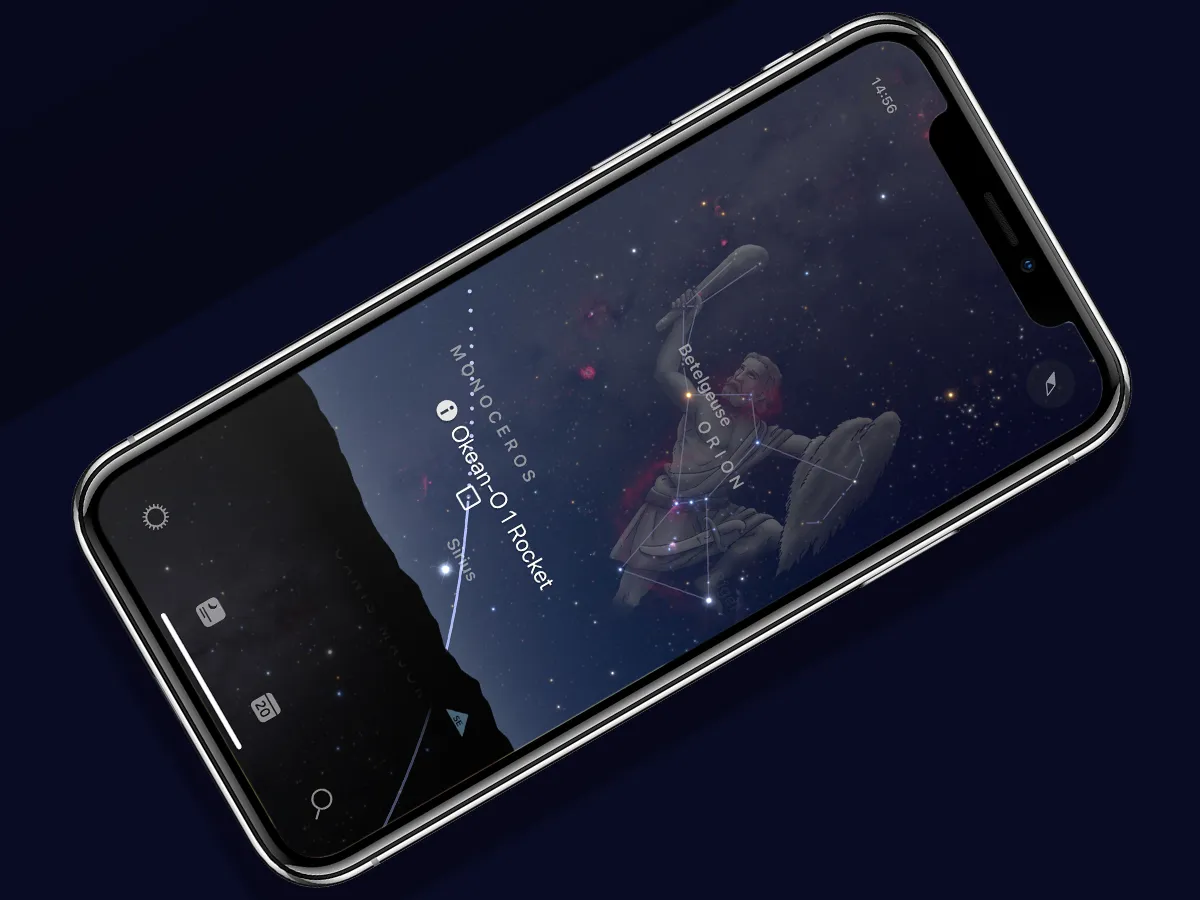
When it comes to stargazing on an Apple device, Sky Guide is unparalleled. Other apps may match its feature set, but Sky Guide has a kind of elegant beauty and usability that makes it a joy to interact with.
You swipe about to explore the stars, tap to get some more info, and use the time-travel function to travel back or forward in time — or, if you hit just the right settings, go all ‘sci-fi swirly sky’ with time-lapse star trails, until you accidentally hypnotise yourself and fall off of your chair.
Buy Sky Guide (free + lifetime and subscription IAP options)
Metamorphabet

If you’ve any tiny humans toddling about the place, you’ll know they are very much of the opinion iOS devices shouldn’t be hogged by adults. Send them into a state of quiet glee with the quirky, playful and charming Metamorphabet.
In this educational app’s oddball universe, letters transform in ways you’d almost certainly not have foreseen: an A grows antlers, turns into an arch, and then goes for an amble. Then a B grows a beard, sprouts a beak, and spews an endless stream of bugs. It’s deranged and imaginative — like CBeebies employed Terry Gilliam as controller — and marvellous to explore for kids and adults alike.
Journeys of Invention
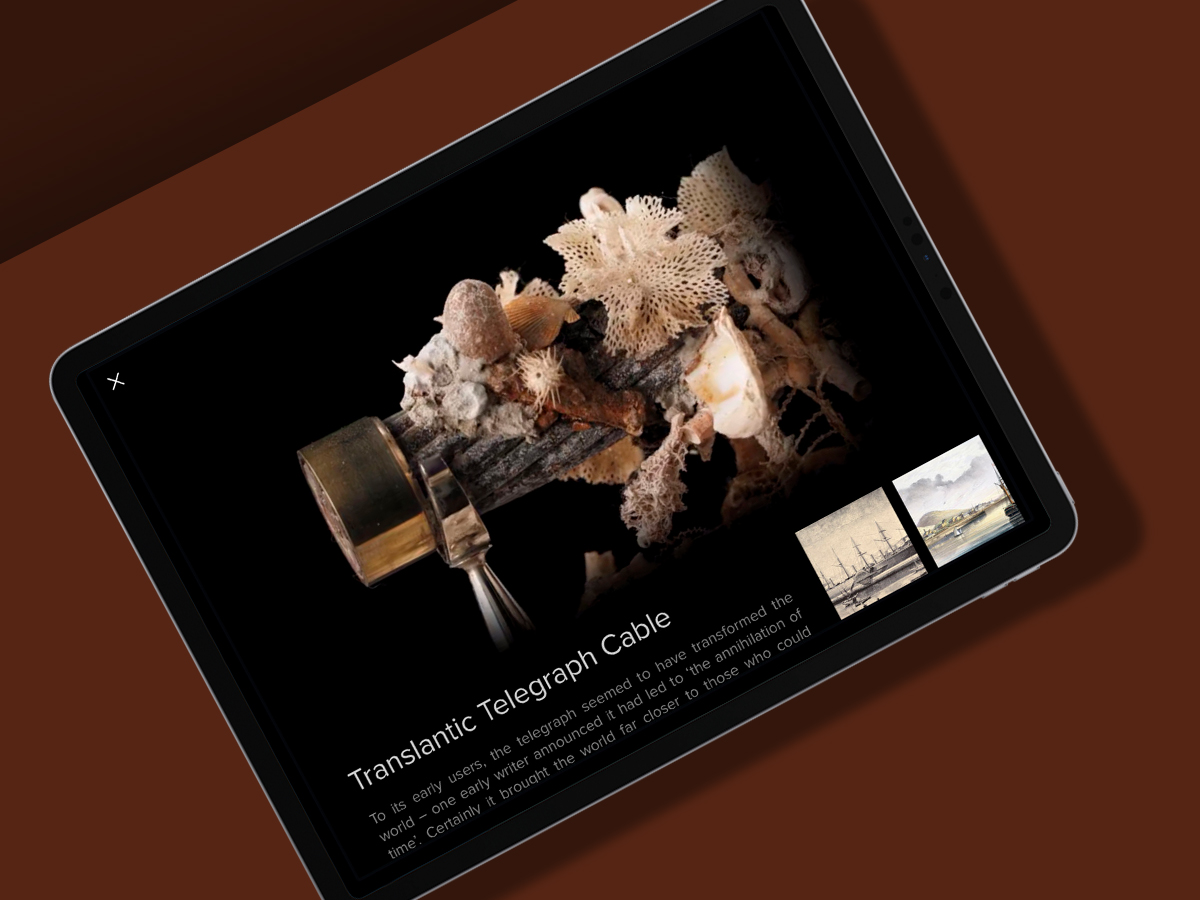
On seeing the original Elements app, it was very clear Touchpress had nailed digital books. The app was packed full of content and beautiful photography, but also infused with interactive components. But Journeys of Invention takes everything a stage further, in terms of ambition and interactivity.
In this app, you explore how science and invention interconnect, often by way of beautifully photographed objects you rotate and study. And unless science is dead to you, it’s hard to not feel a thrill on scrolling around the inside of the Apollo 10 command module, or using an Enigma Machine to send encoded messages to friends.



